Visit These Unique Old Hong Kong Shops Before it's Too Late
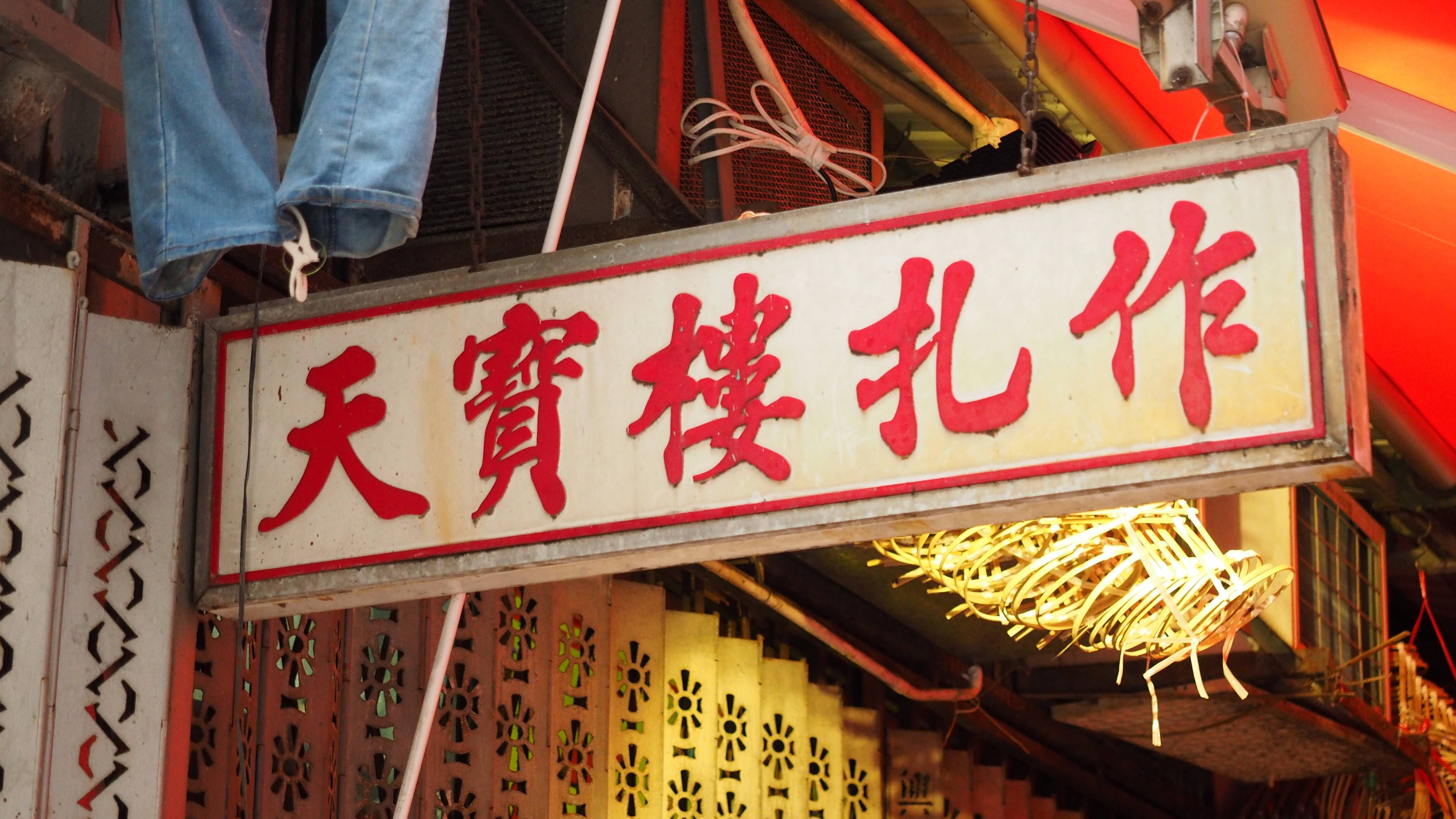
Hong Kong’s past is still very much present in many of its little mom-and-pop shops that are scattered around town. Many of them haven’t changed much from when they first opened their doors, some fifty years to nearly a century ago. These old shops are the silent witnesses of a rapidly evolving city - they have seen rickshaws rushing by and MTR stations being built around the corner, welcomed cheongsam-clad ladies who paid with five-cent coins and now Octopus Card-beeping tourists lugging large suitcases. Many have closed, but some are still in the same place as they were when they started their business, their recipes and skills passed on to a new generation. These family-run shops and cafes are irreplaceable pieces of the city’s history, they constitute the DNA of Hong Kong and define the character of the city's most sought-after neighbourhoods. For many, the corona pandemic was tough, and business was difficult. Some even had to close their doors. But the pandemic also meant an opportunity for in-your-own-backyard exploration and a new-found appreciation of Hong Kong's heritage and culture. Below, you’ll find a selection of ten unique and interesting small shops on Hong Kong Island that are worth a visit and your support.
1. Lam Pan Chun . Tea
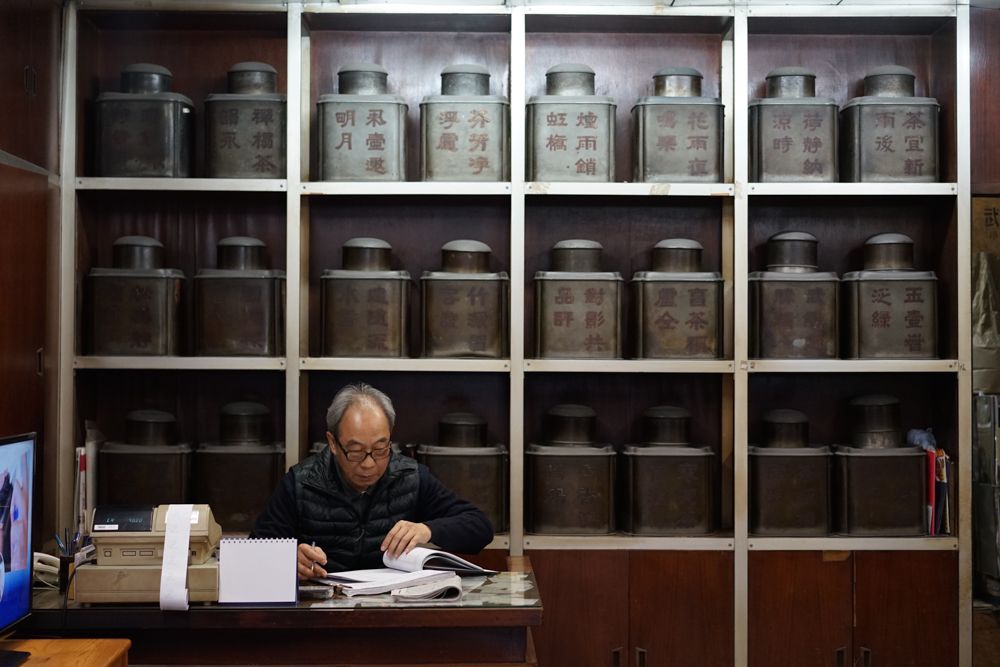
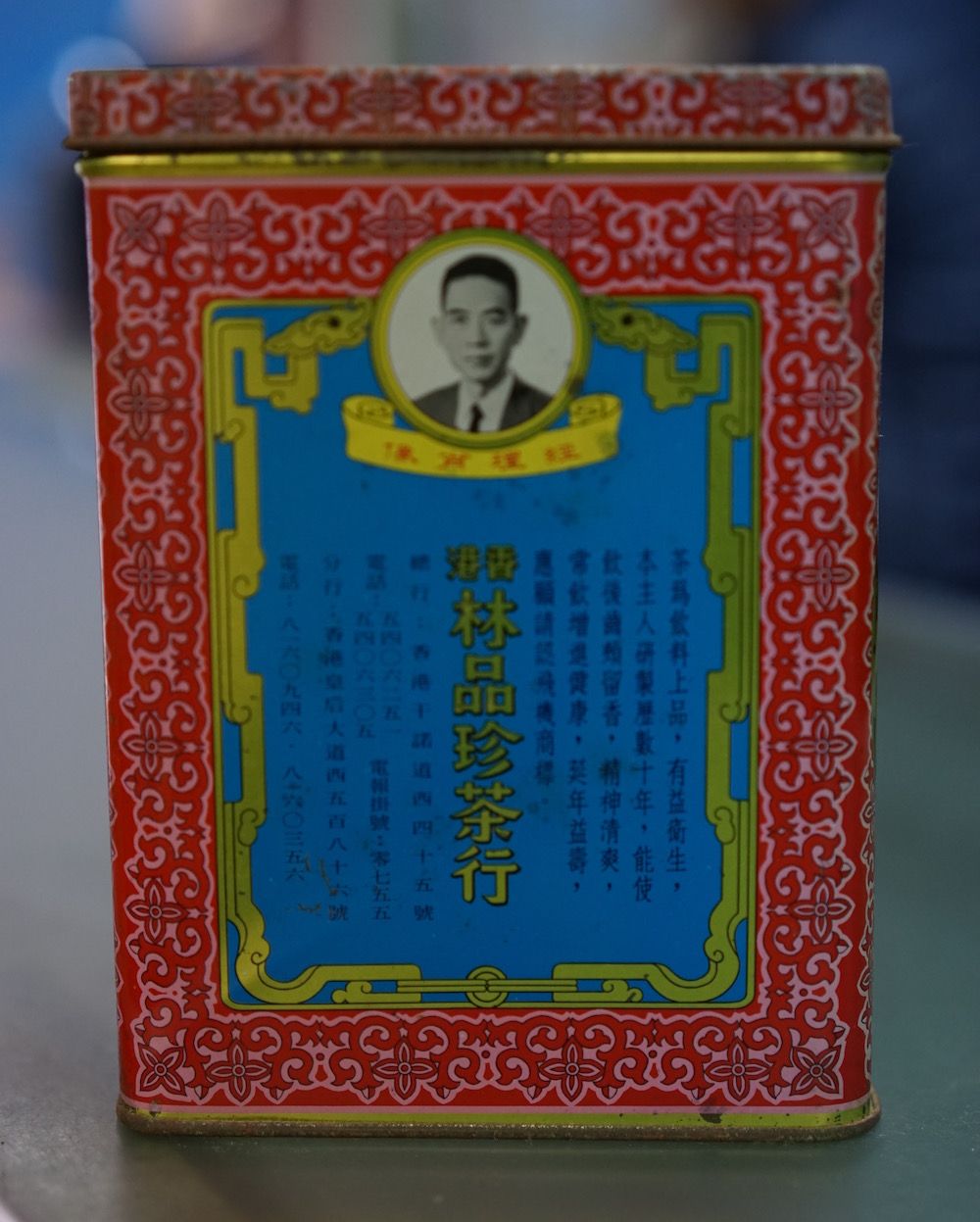
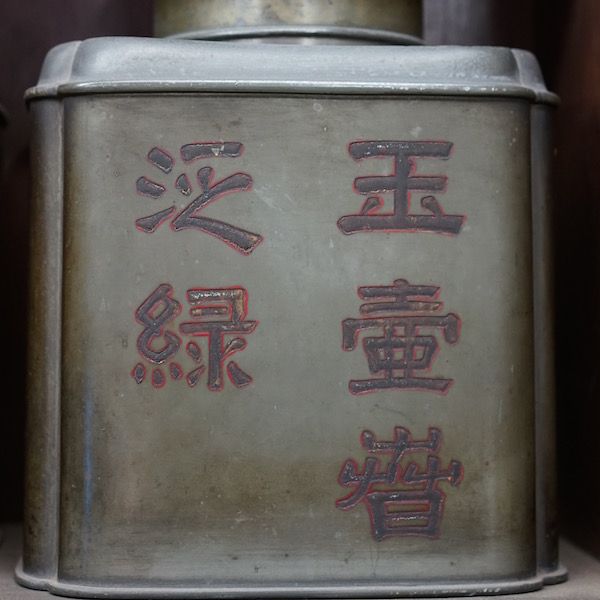
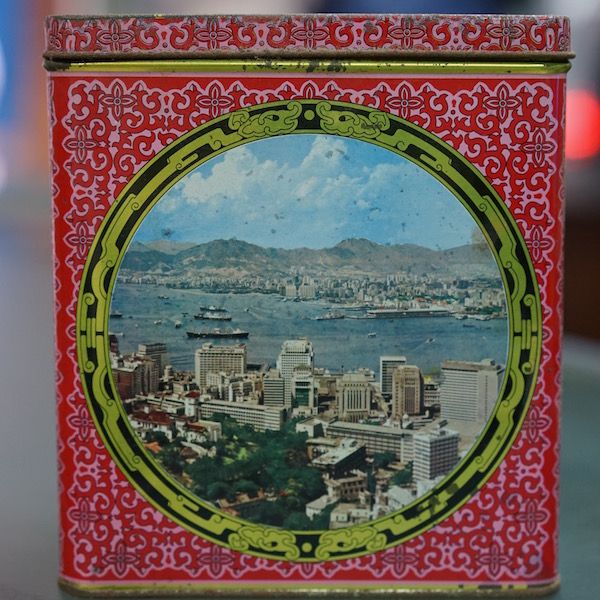
Tea poems
Stepping into Lam Pan Chun is like travelling back to old Hong Kong. The signage, floor tiles, wooden furniture, couplets, and even the tea tins are precious antiques. “No one knows how to make these tins anymore,” says Uncle Lam, 3rd generation owner of the shop. The characters are written in an older type of font that is no longer used these days. The tea poems were written by Mr Lam’s uncle, who extracted them from a Kangxi Dictionary from the 18th century. “I also need to check the dictionary, I don’t know how to read these poems,” admits Uncle Lam with a smile.
On these tins are handwritten tea poems, but no one knows how to make these tins anymore.
Lam Pan Chun is one of the oldest shops in Shek Tong Tsui, on the Western side of Hong Kong Island. It’s been here for over 70 years and counting, acting as a reassuring anchor in an ever-changing neighbourhood. This historical tea shop is a reminder that Shek Tong Tsui was a place many Chiu Chow people called home. Uncle Lam Pan Chun was one of them. He ran a tea business in Shantou and Guangzhou and moved to Hong Kong in 1948 when things got difficult in his homeland. “We were the biggest distributor here, every week we had a container coming in with new stock,” Uncle Lam shares.
What to buy?
Uncle Lam tells us Tieguanyin, a sweet and floral variety of Oolong tea, has been the shop’s bestseller for many years.
Lam Pan Chun Tea | 586 Queen’s Rd West | open Mon – Fri 7 am – 6 pm | +852 2816 0356
2. Se Wong Kau . Snakesoup
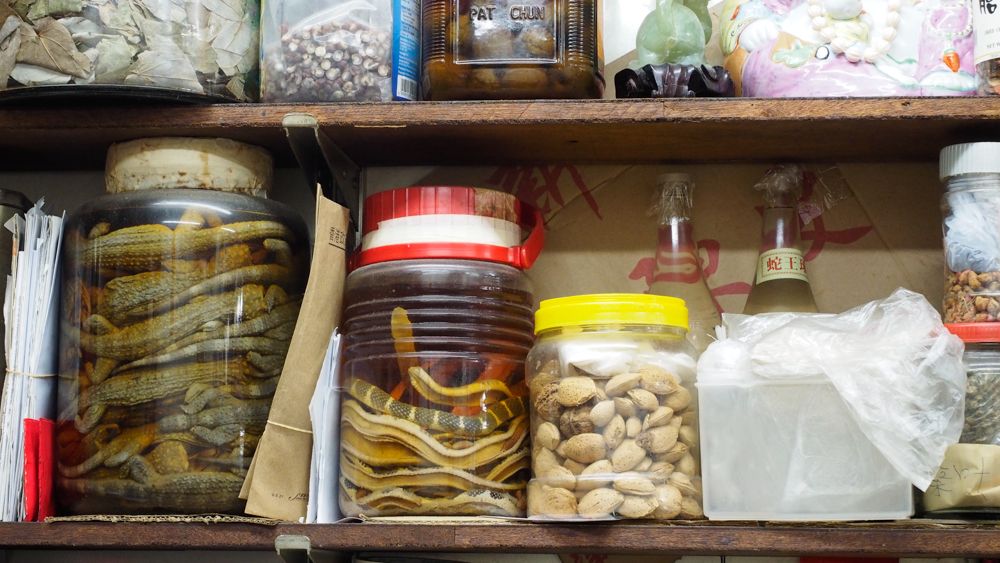
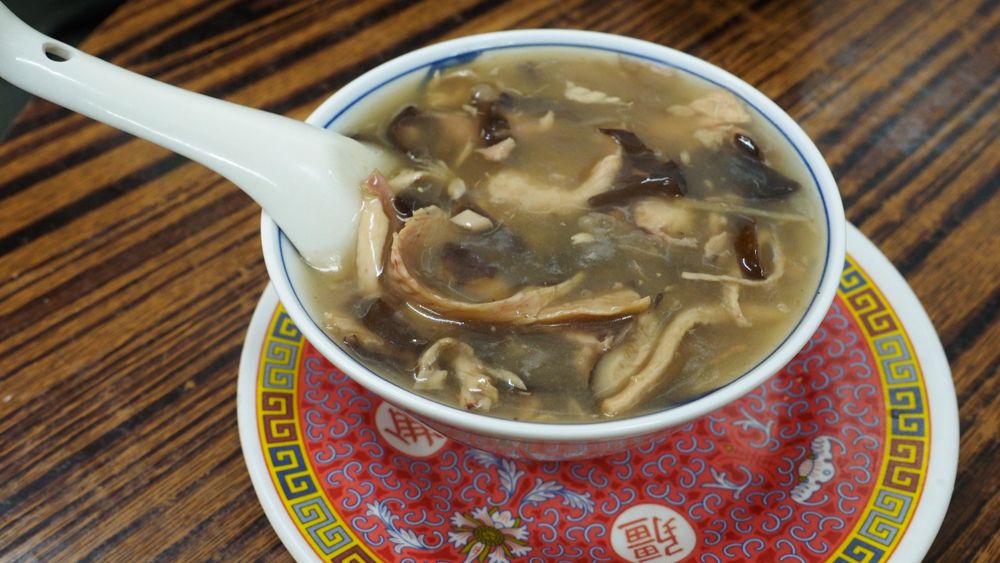
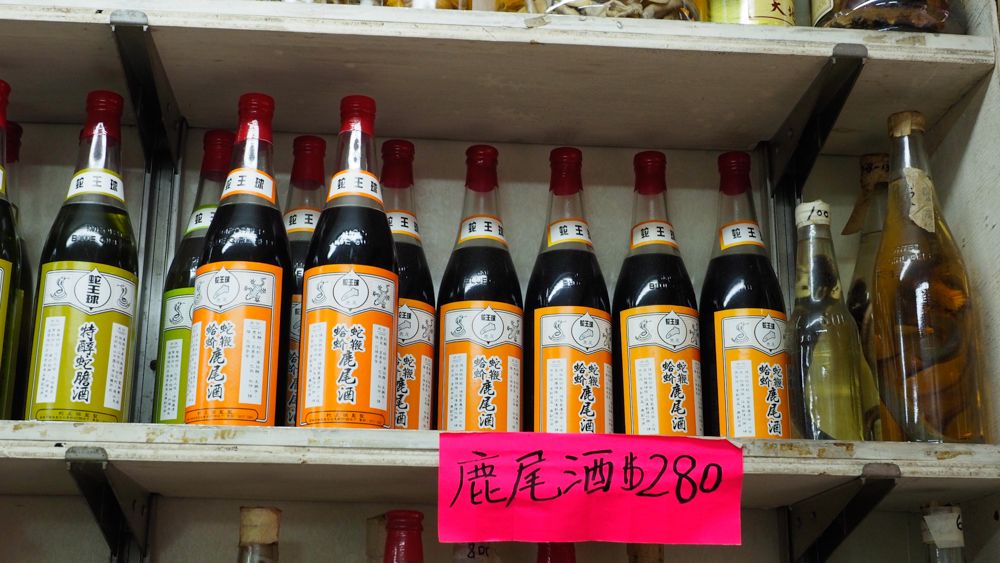
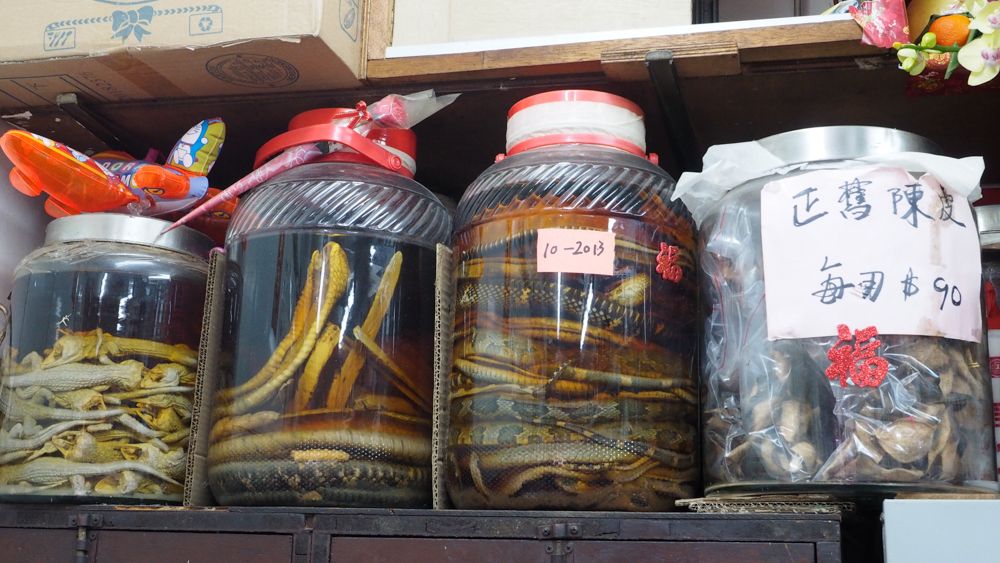
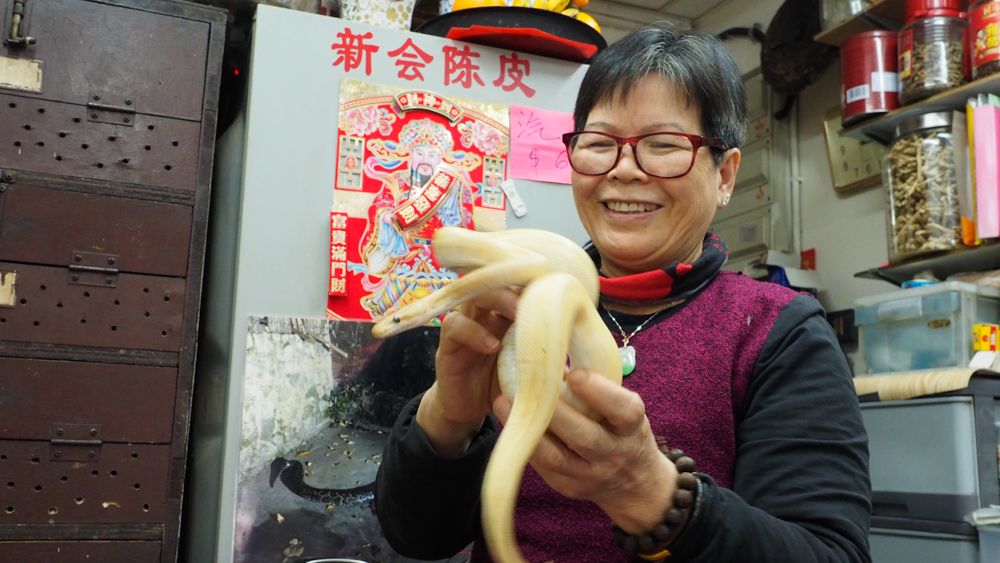
Snakes and more
Se Wong Kau is where the locals in Sai Wan go for a bowl of snake soup. Owner Uncle Chan Tat Kau started his career as a helper of the famous snake master Sin in Wan Chai. He quickly developed a passion for the trade and decided he wanted to become a Snake King himself, just like his master. His wife moved to Hong Kong from China and the couple opened their own shop. “I was really scared the first time I touched the snakes. But now I’m not afraid at all, they are just like loaves of bread,” says Auntie Chan while taking out a snake from the wooden snake cabinet. The plaque hanging at the shop’s entrance was a gift from the great snake master Sin.
The shop closes every summer from June to August when Uncle and Auntie Chan head back to mainland’s thick forests to catch snakes. “We easily catch dozens of snakes a day,” says Auntie Chan. Snakes in summer are fiercely active and potentially poisonous, so the couple wears thick gloves to protect themselves. Back in Hong Kong, they store their catch in the store’s wooden cabinet, feeding them rats to keep them healthy and happy.
In the summer, we easily catch dozens of snakes a day.
What to buy?
There’s something for everyone at Snake King Kau. And Auntie Chan is happy to recommend depending on your health, your mood, or the weather. Try their fried snake roll ($78) or snake meatballs ($29/4 pieces) for a different experience! Not into snakes? King Kau also stocks some other amazing exotic foods like Golden Coin turtle eggs and gecko wine, all very good for your health.
Shop 21 G/F Dragonfair Garden | 455-485 Queen’s Rd West | Open Mon-Sun 12 nn – 12 am | +852 2816 6969
3. Tuck Chong Sum Kee . Bamboo Steamers
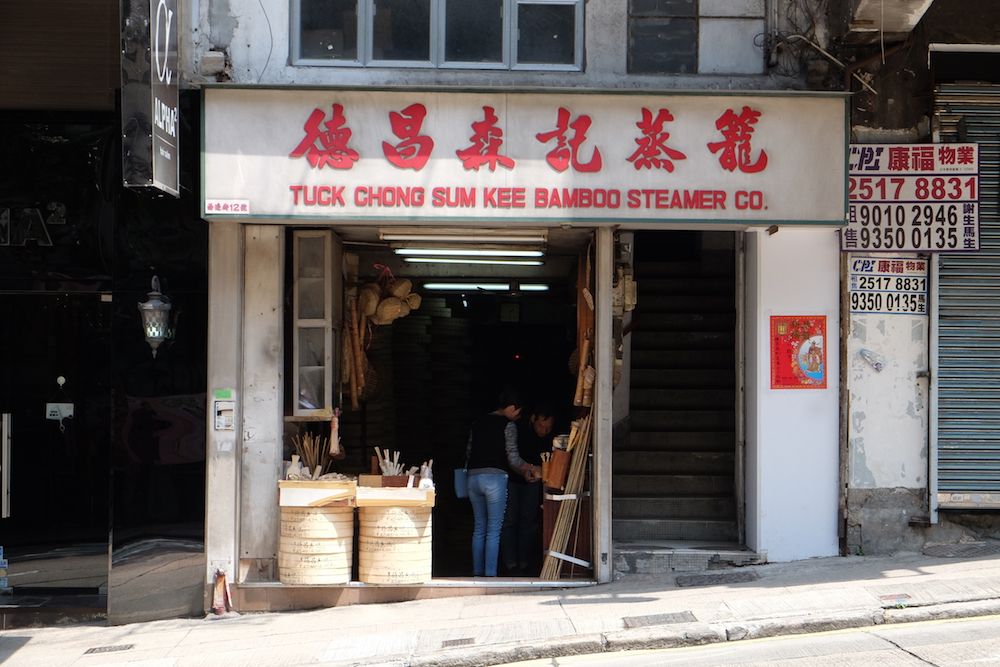
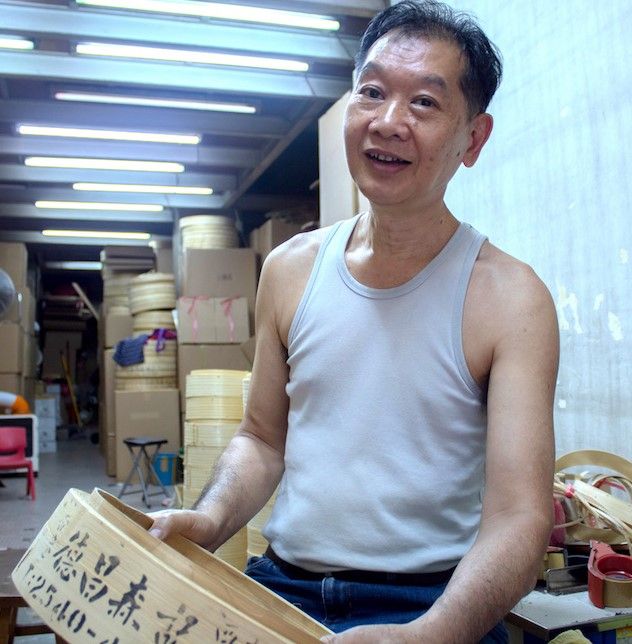
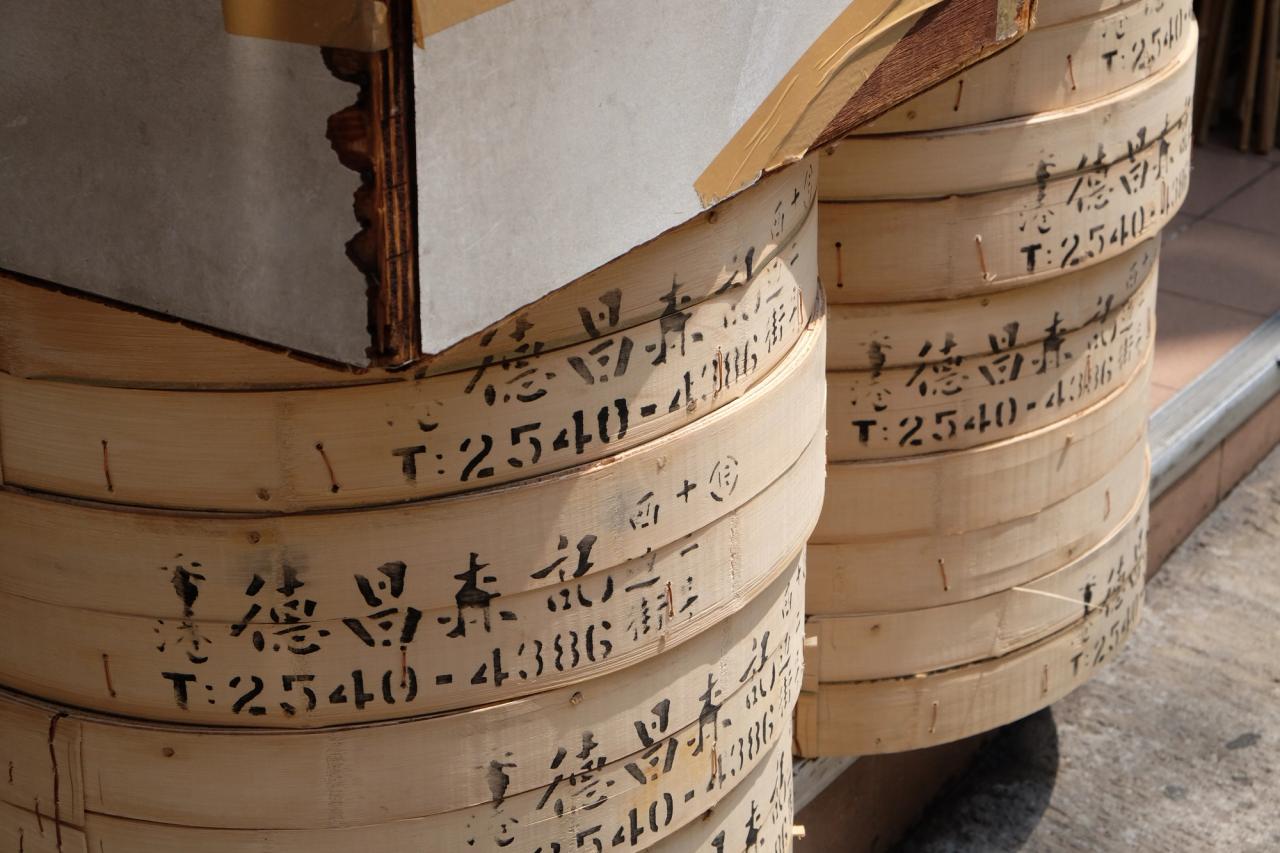
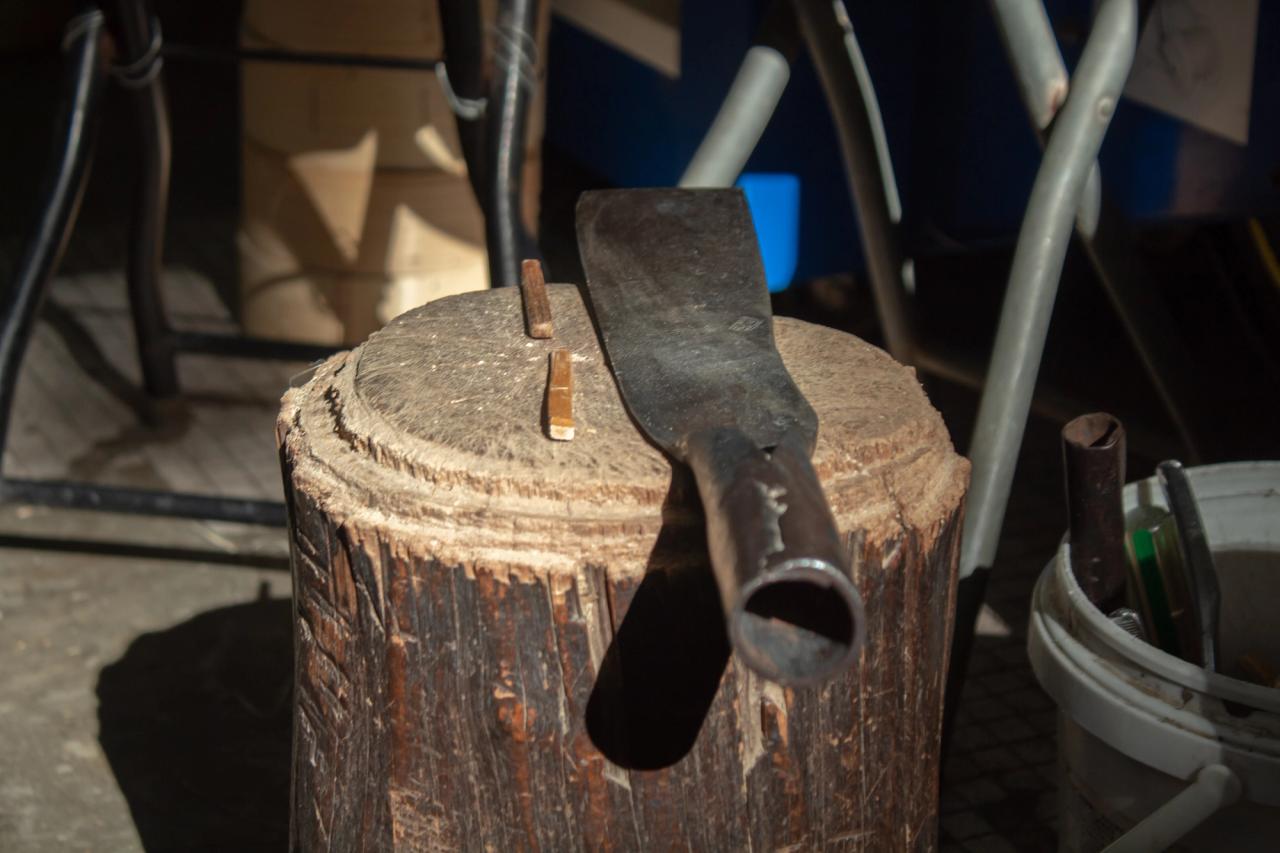
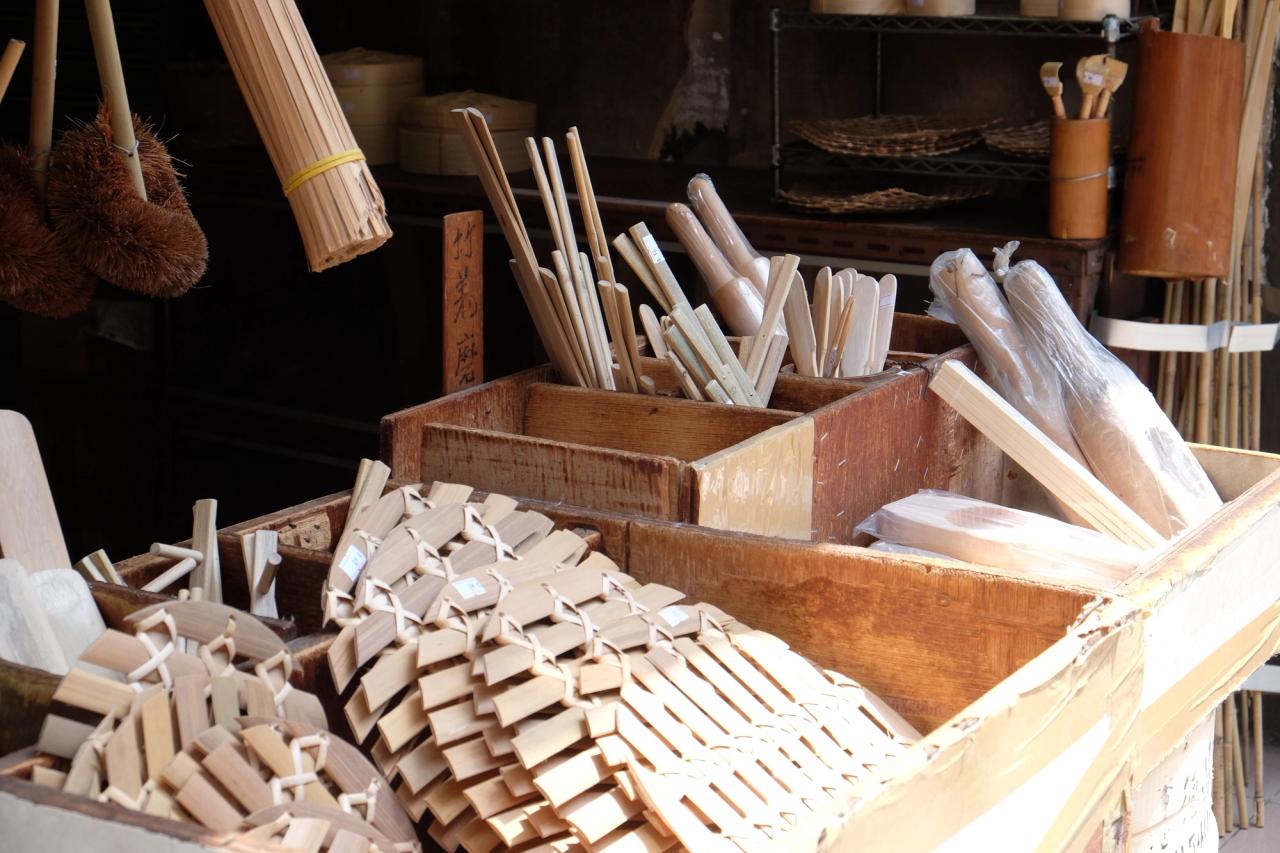
A sunset trade
Tuck Chong Sum Kee is one of the last places in Hong Kong that makes bamboo steamers by hand. It takes three years to learn how to hand-make a steamer from a single piece of bamboo, a skill that is increasingly being replaced by low-quality mass production. The Lam family has been making bamboo cooking products for five generations, stretching all the way back to the current owner’s great-great-grandfather, who travelled between village markets in Guangdong to sell his steamers. Lam Ying-hung, who runs the business, says factory-made steamers last just a month or two, while his steamers can put up with a full year of intensive use. That may be the reason why his clients include famous restaurants such as Lin Heung and Luk Yu Teahouse.
What to buy?
The shop carries a great selection of bamboo steamers, but also other bamboo products that make for sustainable cooking like spoons, coasters and chopsticks.
Tuck Chong Sum Kee | 12 Western Street | open Mon-Fri 9 am – 5 pm | +852 2548 8201
4. Tin Bo Lau . Jos Paper Products
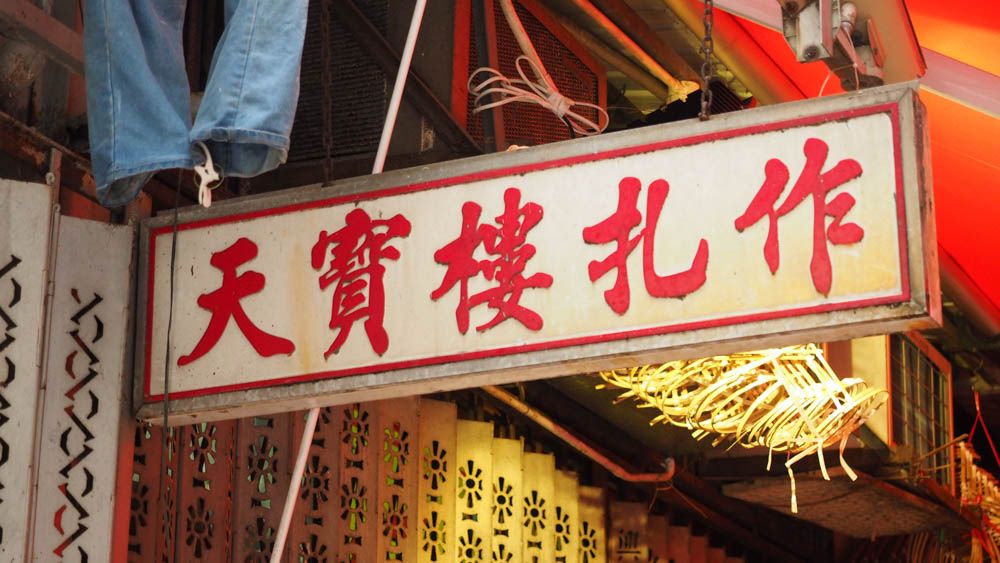
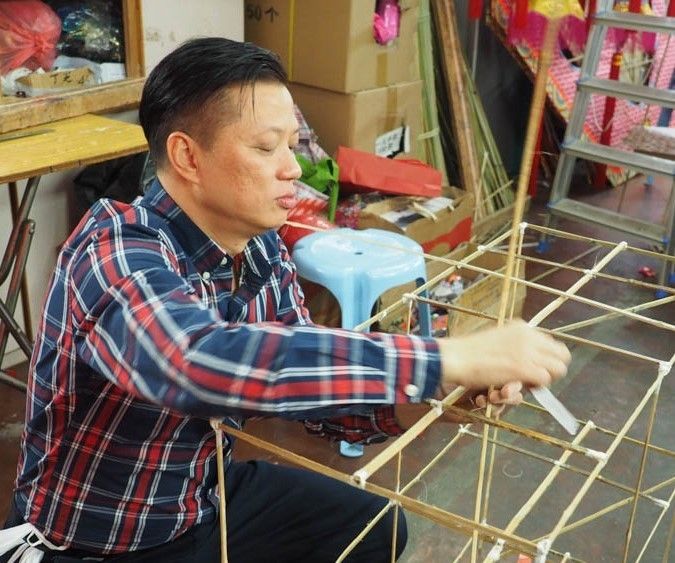
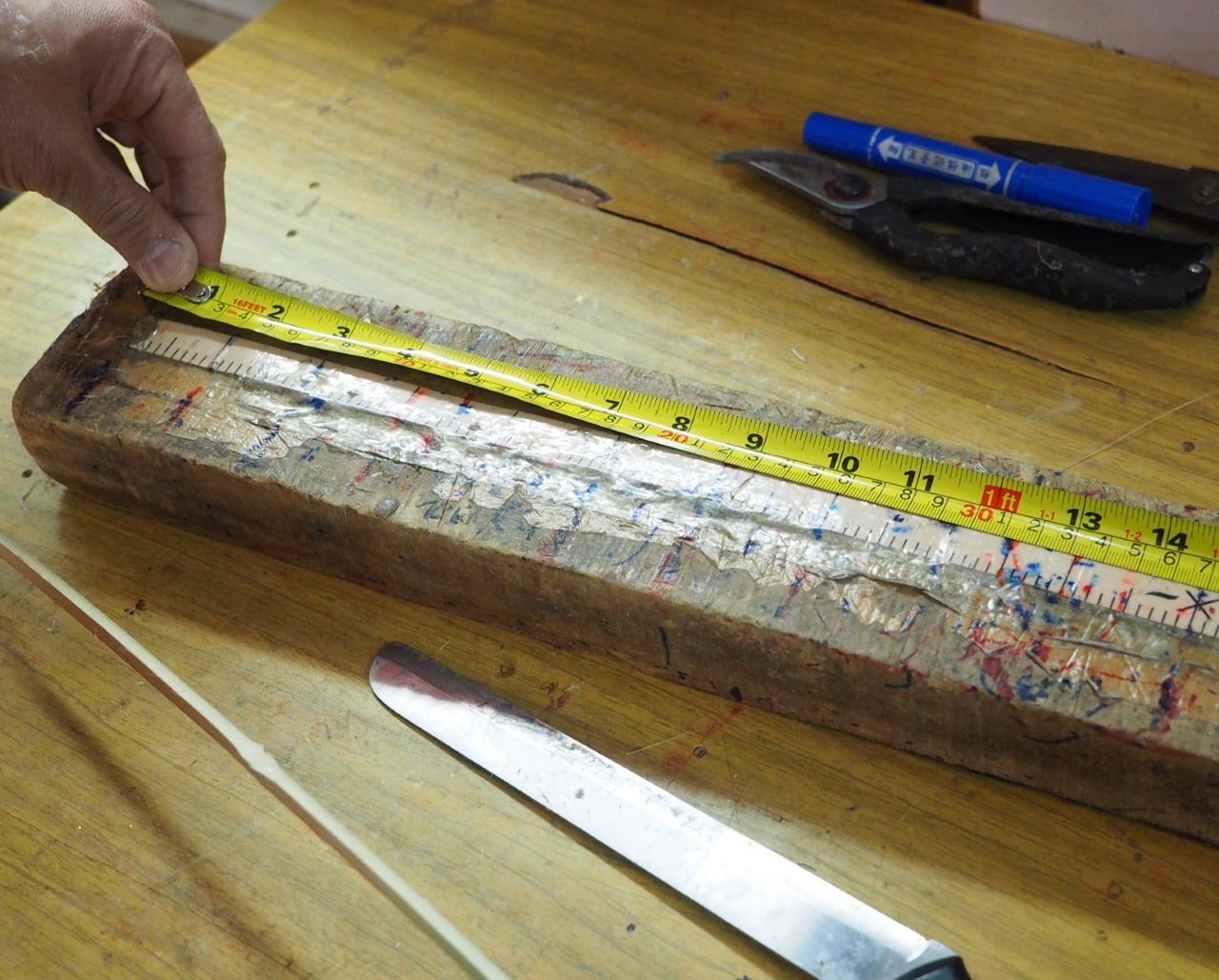
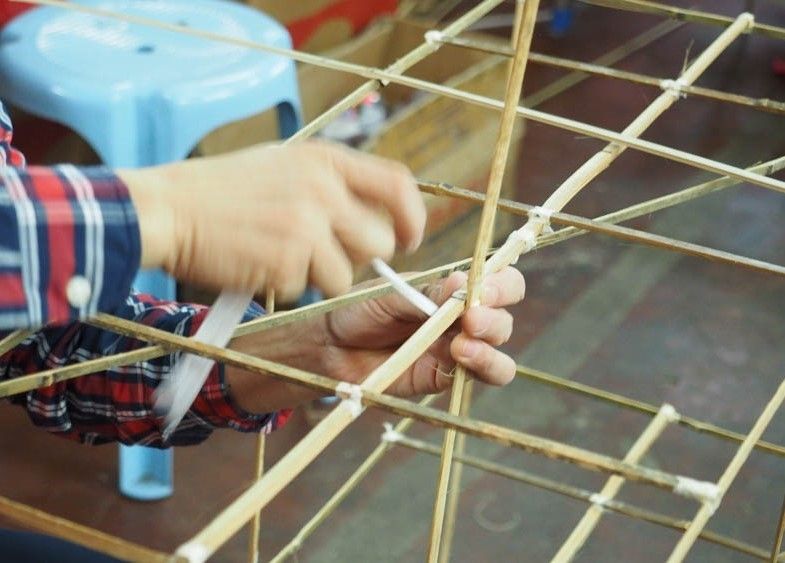
Festive industry
“Where there are Chinese, there are festivals and there will always be lanterns and papercrafts,” says lion dance master Ha Chung Kin who started Tin Bo Lau 40 years ago. He started out by making lion heads, then also other types of paper offerings, lanterns, and flower arrangements. Tin Bo Lau is now in its 3rd generation. Although you can’t buy lion heads here anymore, this is still the place to go for festivals and funerals. “The paper-crafting industry has never deteriorated. The busiest time of the year are the Hungry Ghost Festival and the Mid-autumn Festival when our orders can jampack a 20-feet container!” says master Ha.
Master Ha is a proud craftsman. “The art is to reinvent your skills. A papercraft master is someone who can create what the customers want and keeps up with the trends. We created our own version of a 2-story Spanish house with a veranda and backyard which is now very popular. We also invested in a new type of paper that it is more resilient to water and wind.” In his career, he’s had some unusual requests. “I once was asked to make a giant mummy for Halloween”, master Ha remembers.
To celebrate the 20th anniversary of HKSAR’s handover, Tin Bo Lau created the largest hanging lantern in the world and broke the Guinness Record. It was more than five metres wide and nine metres high. The most precious piece of equipment in the workshop is an old-fashioned Chinese ruler. When Ha heard that the master maker was about to retire, he quickly purchased his whole stock of 1,000 rulers.
Where there are Chinese, there are festivals and there will always be lanterns and papercrafts.
What to buy?
Locals come here to buy paper products to burn at their ancestral graves from food items to Louis Vuitton handbags. The Tin Bo Lau crew also gives lantern-making tutorials for students, families, corporates and even prisoners.
Tin Bo Lau | Shop C, Basement, Tung Cheung Building |I 1-11 Second St | +852 2540 5439
5. Saam Hui Yaat . Dim Sum
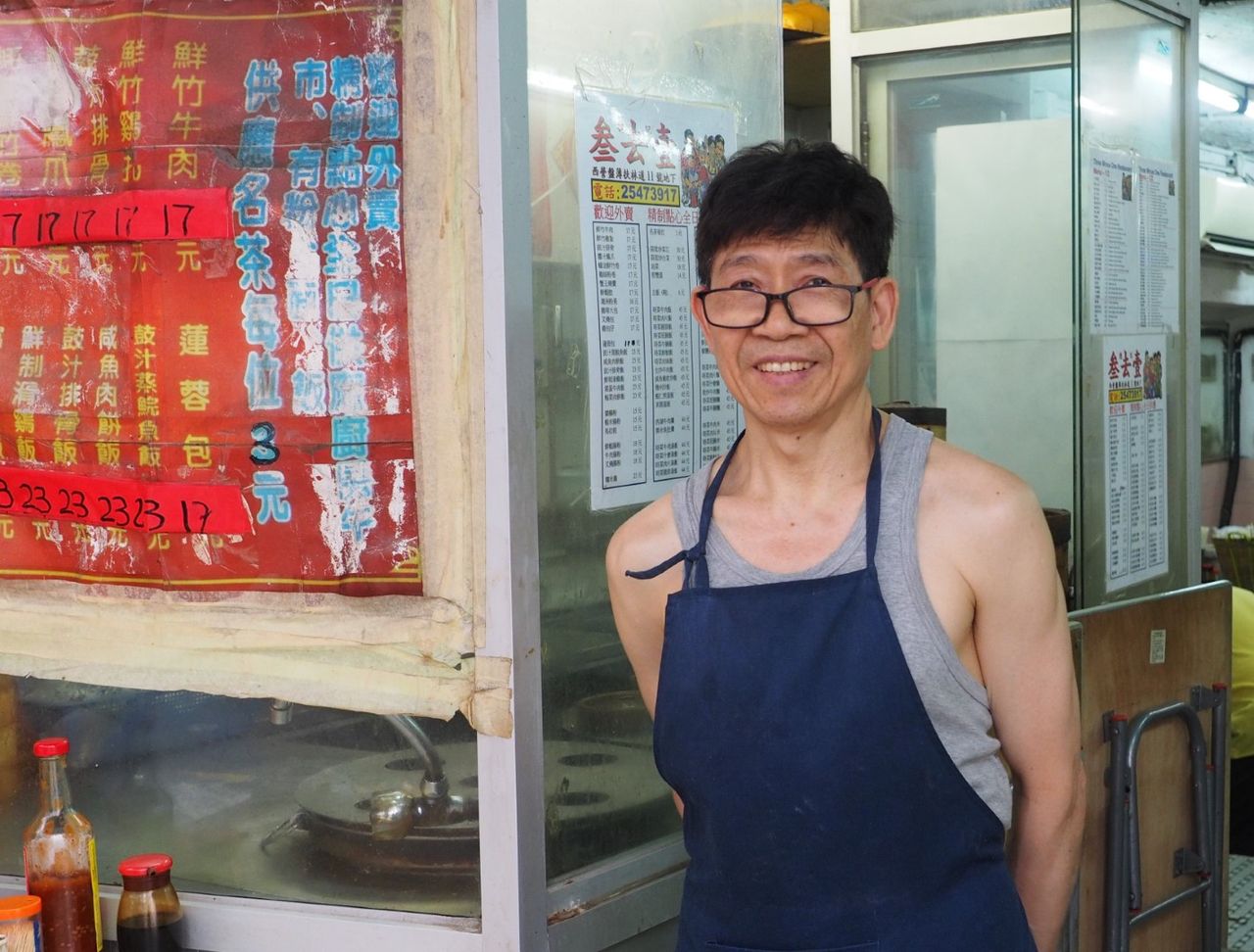
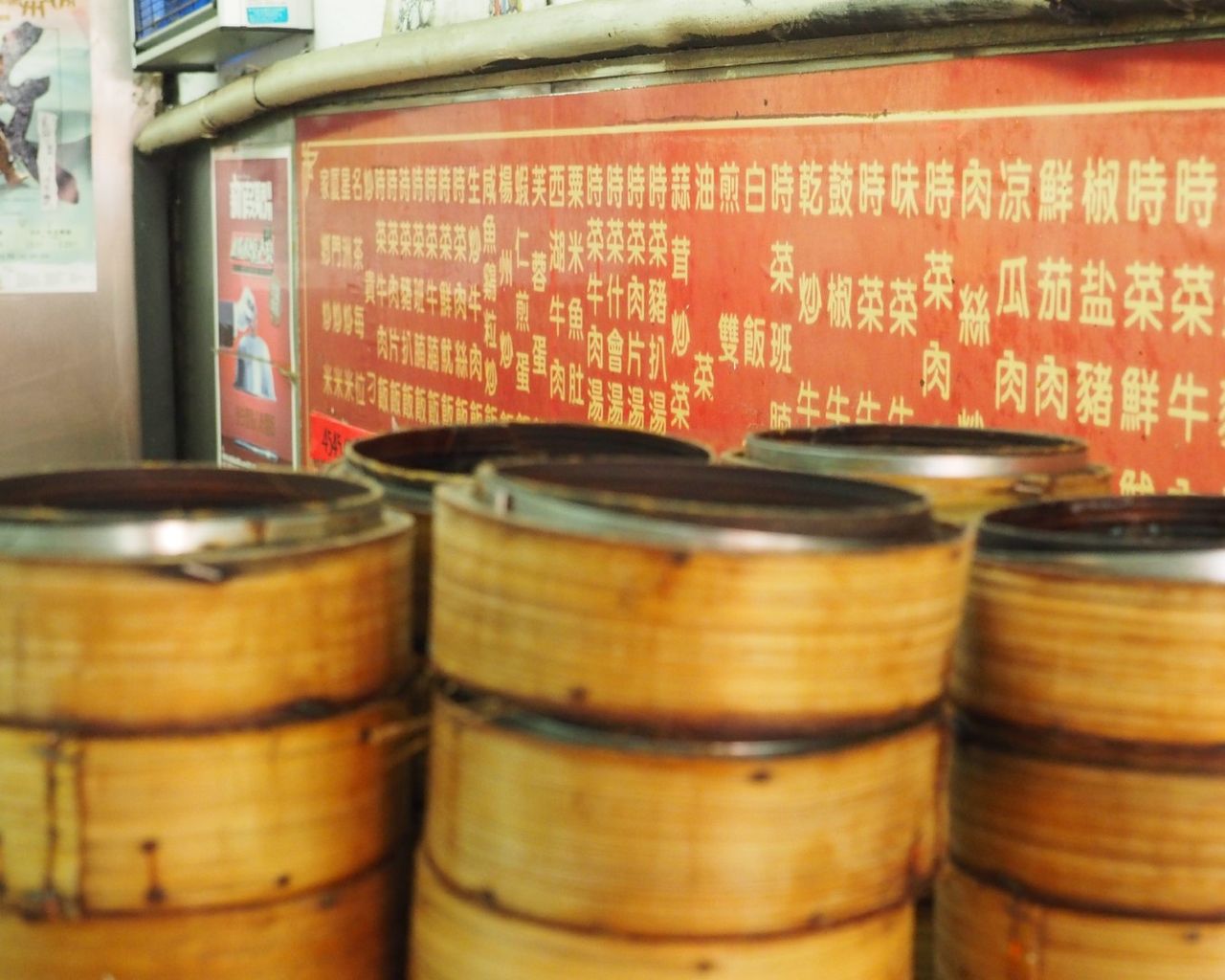
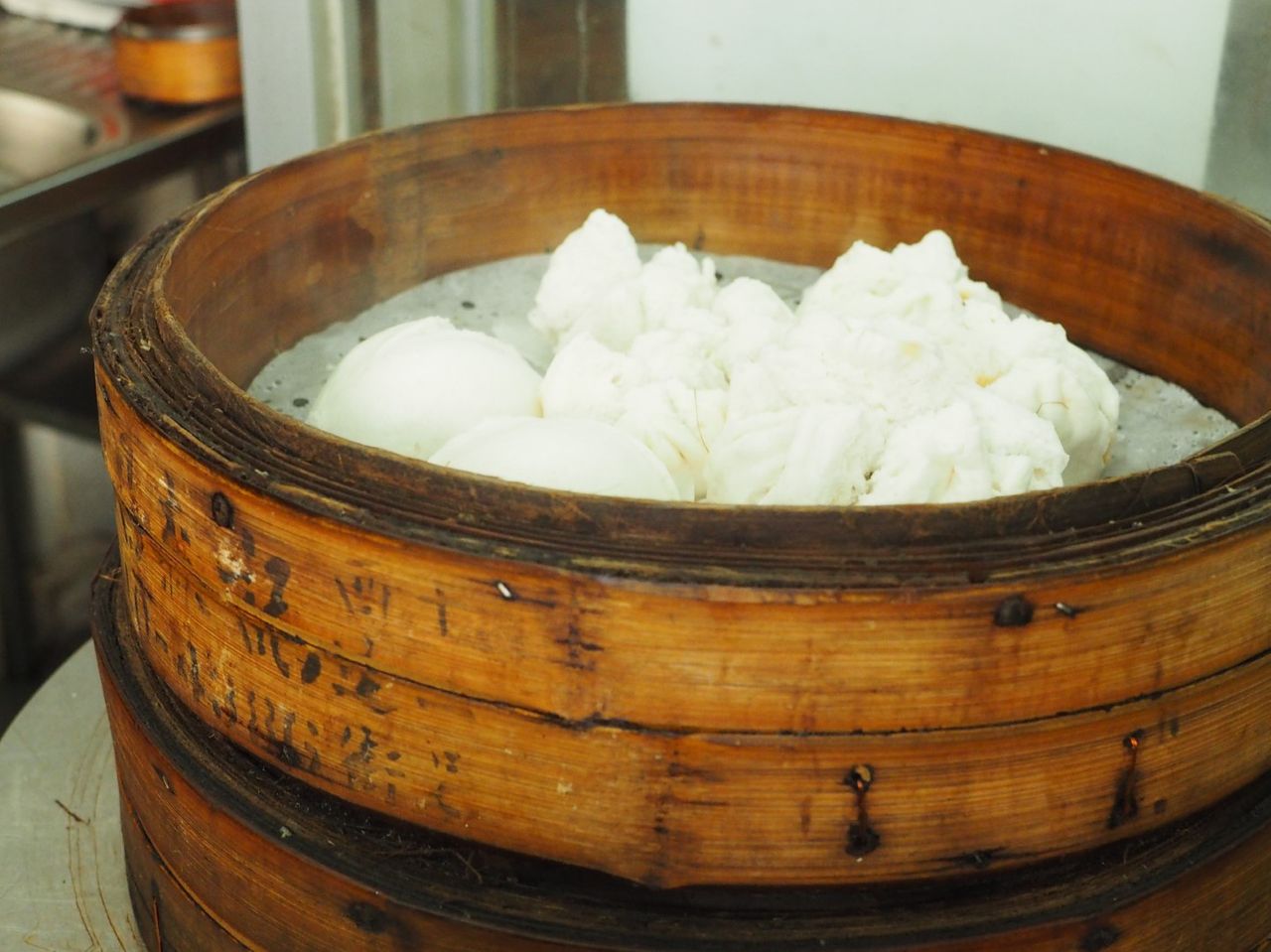
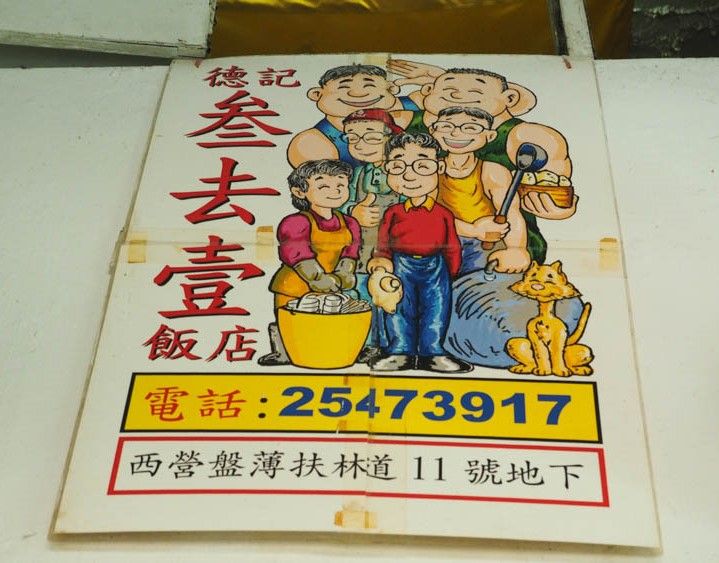
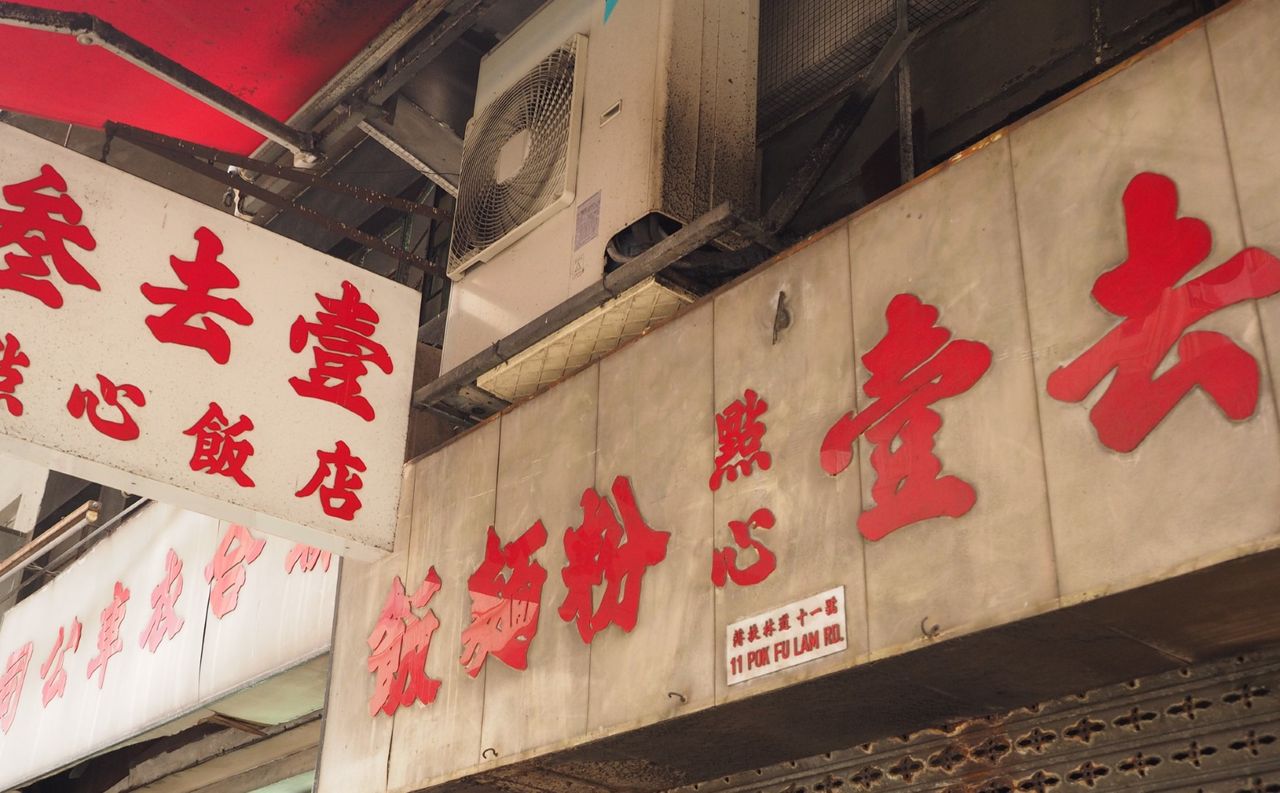
Community hangout
This is a popular breakfast spot in Sai Ying Pun! The customer base is a nice mix of elderly and students in the area. Saam Hui Yat has had the same menu for years. The five chefs, who have been in the industry since they were teenagers, start work every day at 3am. They all have a different role: making dough, slicing vegetables, frying meat, preparing fillings, and steaming buns. Owner Faat Goh insists on using bamboo steamers from Tuck Chong Sum Kee, also in the Sai Yung Pun neighbourhood: “[Their steamers] are a bit more expensive but a lot more durable. Also, each dish has limited daily supply to reduce food waste,” he says. Saam Hui Yat literally means ‘three goes one’. The name has nothing to do with how many dim sums fit in a basket, it goes back to the days when the eatery was owned by three shareholders, and one left…
What to order?
Try the chicken bun (HK$17), the most popular dish. It’s huge and truly good value for money!
Saam Hui Yat | 11 Pok Fu Lam Rd | open Mon-Sun 5 am-2.30 pm | +852 25473917
6. King's Shoes . Embroidered Slippers
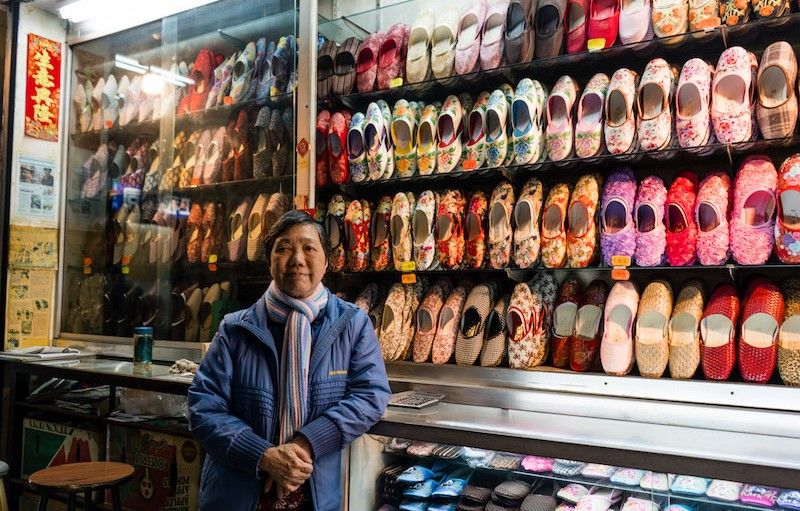
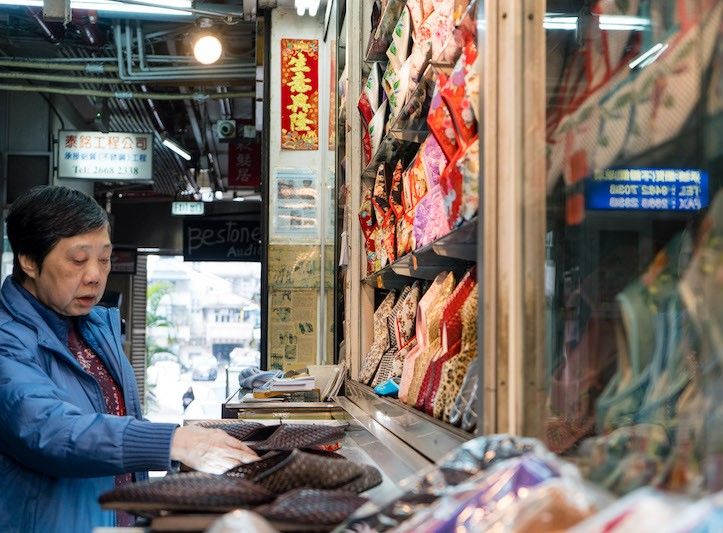
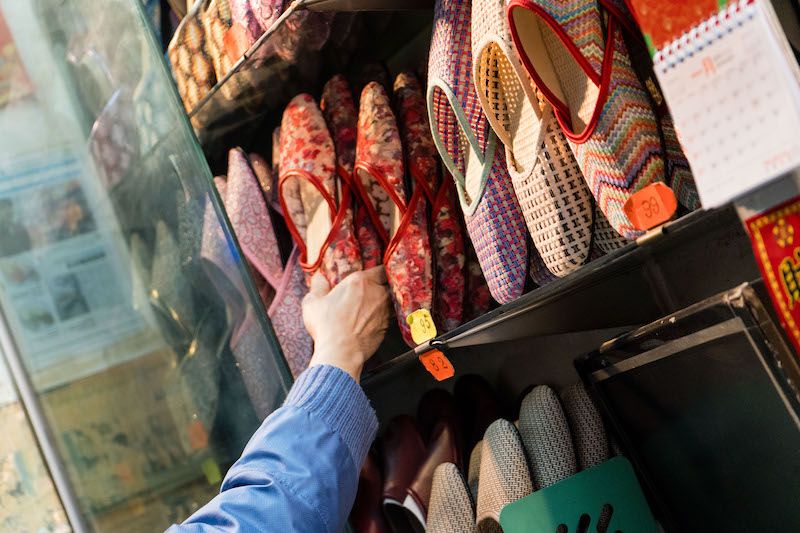
Delicate embroidery
When King’s Slippers company, opened in 1960, their delicately embroidered shoes were a big hit among the upper-class Shanghainese in North Point. “Shanghai people greatly focused on their appearance; they would come here to buy new shoes,” says shop owner Auntie Li. Back in the day, wearing embroidered slippers indoors was a luxury that only a select few could afford to avoid the dirty kitchen floors of the housing estates. This tiny shop has had many celebrity clients, including the late Li Lihua, a Golden Horse Award winner for Best Leading Actress.
A typical family business, King’s Slippers entire production line is Hong Kong-based. 2nd generation owner Uncle Li buys the fabric in Sham Shui Po and then brings it to a workshop in Tsuen Wan for production. Auntie Li takes care of the sales. “In those days, many local masters were making these shoes, often with their wives,” she explains, "now we're among the few that still make the slippers by hand.". Still, every Chinese New Year, this small shop gets really busy. Auntie Li needs to call in extra staff to help the many customers who come to here to buy the shoes as gifts.
What to buy?
Delicate and beautiful, these classic shoes will never go out of style.
King's Slippers | G /F, Majestic Apartments, 315 King’s Rd | open Mon-Sun 10.30 am-8.30 pm | +852 2570 3560
7. Chun Nam . Noodles
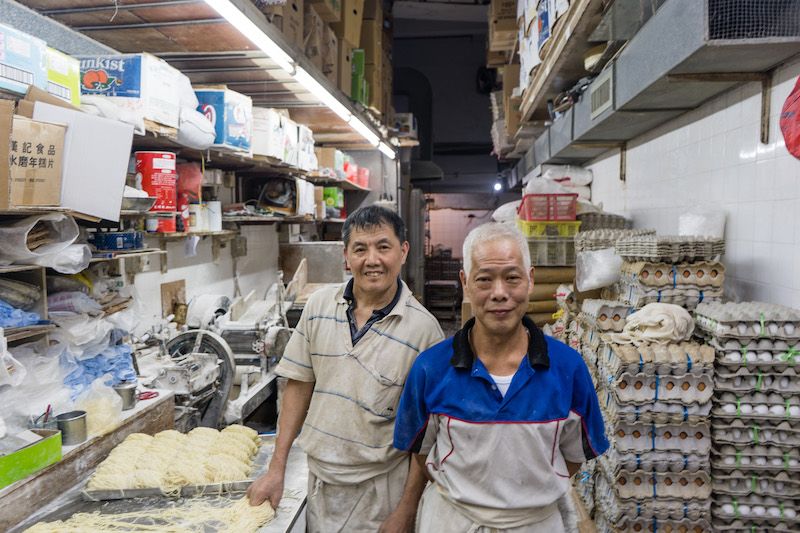
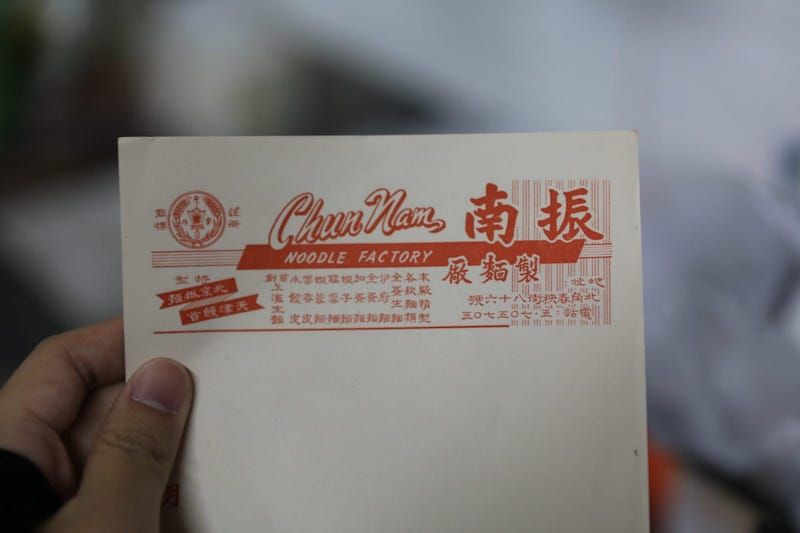
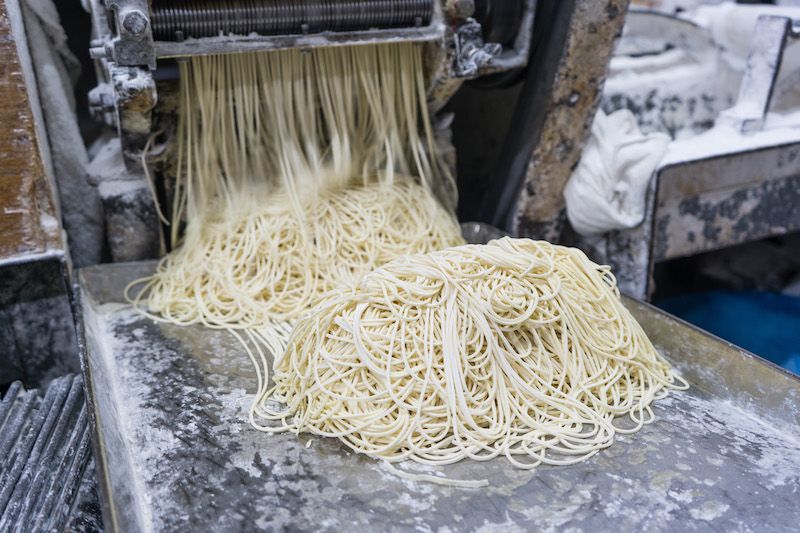
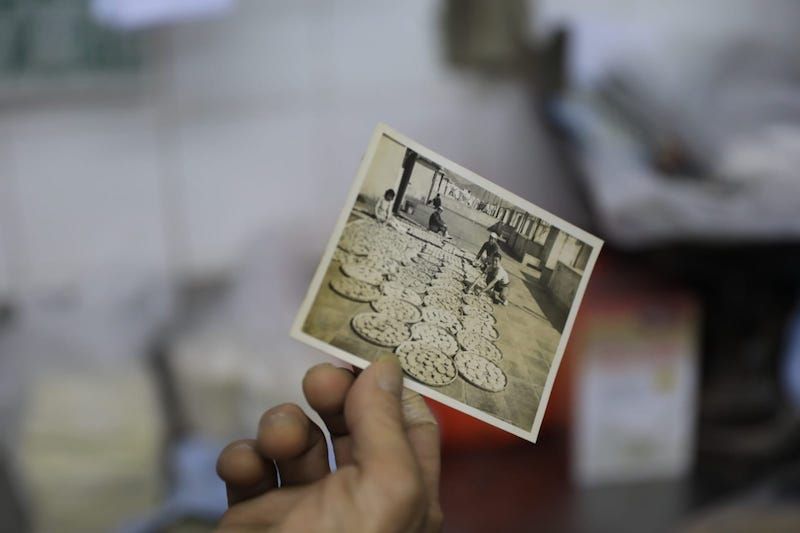
Shanghai style
This unassuming noodle factory was a first-hand witness to much of Hong Kong’s history. Master Lee, who has worked at Zhan Nan since 1979, is now 60 years old. At that time, North Point was nicknamed “Little Shanghai, so Chun Nan branded themselves as “the inventor of Shanghai Noodle”. “Back then, there were lots of noodle shops along the street, Shanghainese and Guangdong versions, it was bustling day and night.
We don’t need promotions; customers will buy our products if they need to. Just like the Wulin martial arts masters, where the heroes have extreme skills, but stay modest.
"Making noodles can be both a very simple and very complicated act. All noodles are essentially made of flour and water. The difference lies in the ingredients one adds." Master Lee shares. When he was an apprentice, he spent almost all his time in the factory, from morning until evening. Now, even at the age of 60, he wakes at 4am, works more than 15 hours per day and only takes three holidays annually during Chinese New Year. He eats noodles for all his meals. "I only spend two minutes to eat breakfast." he shares with a smile.
What to buy?
Here you can buy traditional vermicelli, shrimp noodles and even spinach noodles. In the past, people even buy 'noodle vouchers' to give as presents.
Chun Nam Noodle Factory | G/F, Ka Bo Building | 106 Chun Yeung Street | +852 2570 5705
8. Kam Hing . Letterpress Prints
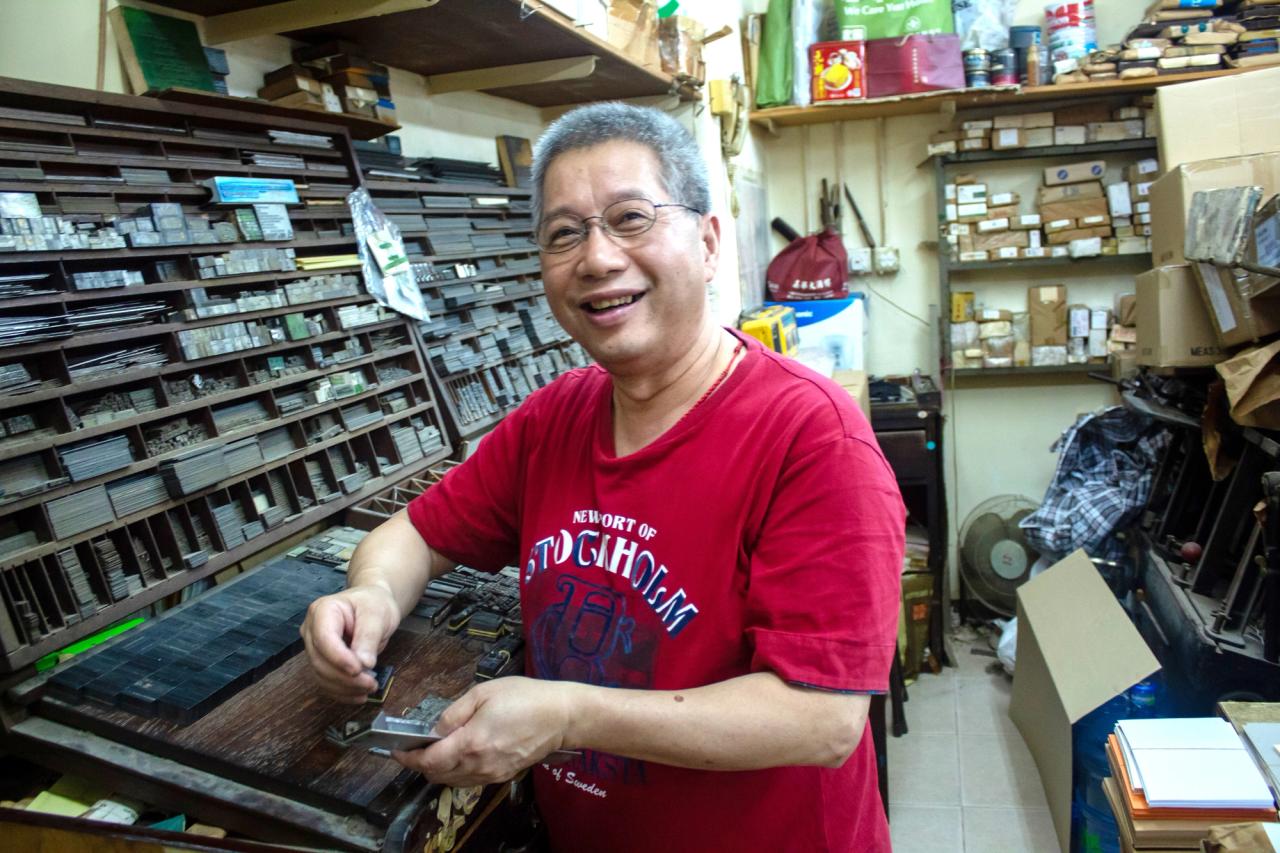
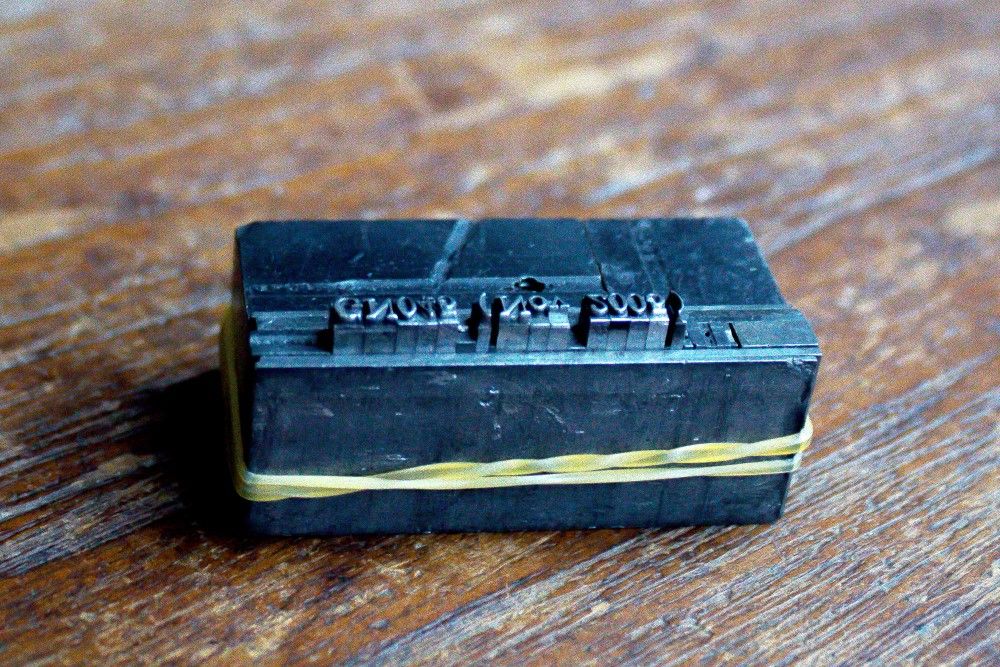
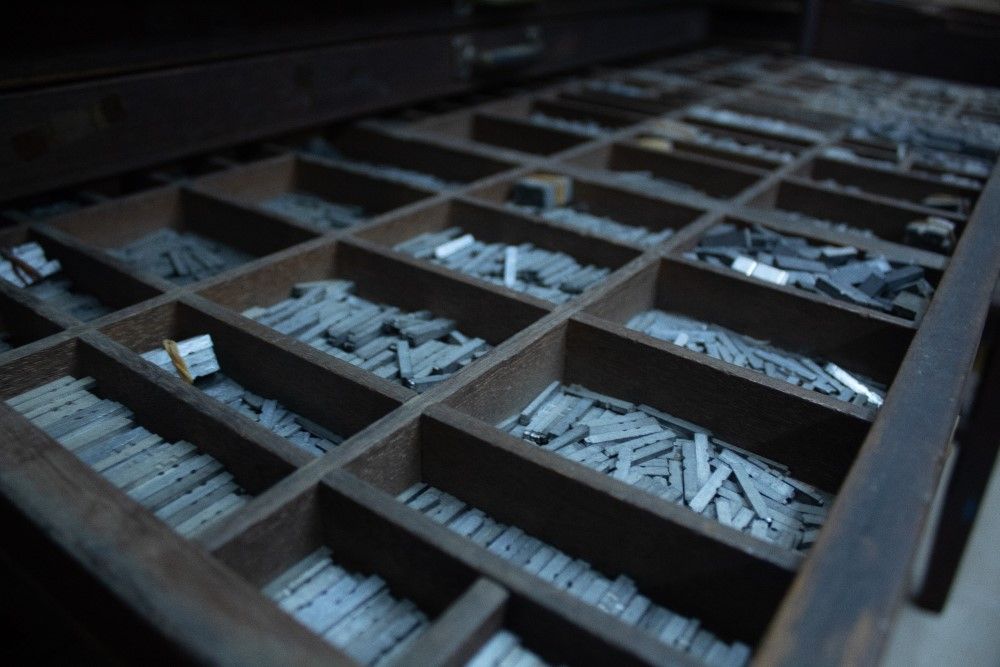
The busiest time was 1989 when the stock markets were doing well, I worked till 9pm every day.
Letterpress
Kam Hing is an old-school print shop, operating an original letterpress machine, pretty unique, there are not many of these machines left. The collection of lead type face is neatly stored in wooden boxes. English letters in alphabetical order, the Chinese characters in cube shelving with the type stacked into a square or column, facing outward, for easy identification.
Central and Sheung Wan were once the epicentres of the city’s printing industry, home to family-run printing companies and suppliers of paper, ink or envelopes. Over the years many closed or moved east, but uncle Leung still recalls the time when he spent more time at work than at home. “I used to work more than 8 hours a day, the company also provided food for all workers. The busiest time was 1989 when the stock markets were doing well, I worked till 9pm every day.” he says.
What to buy?
Kam Hing still prints calendars and leaflets for their loyal customers. They're also happy to do custom orders for name cards.
Kam Hing Printing | 19 High Street | Sai Ying Pun
9. Master Ng . Chops
A small alley of roughly 20 market stalls with hand-made chops, stamps and name card printers, Man Wa Lane has been around for nearly a century. Dating back to the days when a company chop was needed for every document or paycheque, this was the go-to place for Hong Kong's many trading companies. 80-year-old Pun Han Sin Koon is one of the few stalls left. “This used to be a 3-in-1 industry, we did letter-pressing and card-printing and I carved stamps in my spare time” explains Ng who has been in the industry for four decades. His work even ended up on the 100-dollar note.
“Nowadays, many orders go to the factories, but hand-made stamps are irreplaceable. I only realised when I saw the news on TV to see my design on the newly printed cash. It was Standard Chartered 2010 note”. Chop making has become a fading trade, but Master Ng is not yet on his way out: “I stock all types of materials for stamps - wood, stone, jade, buffalo horn - six types of ancient Chinese fonts, English and even cartoon figures. “As long as there are words, I can create."
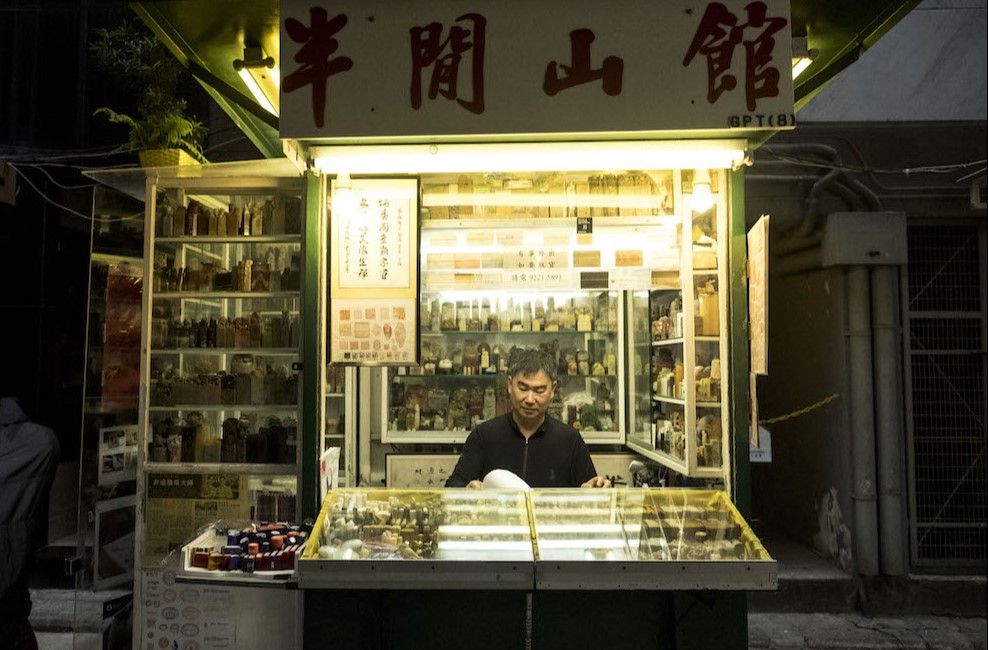
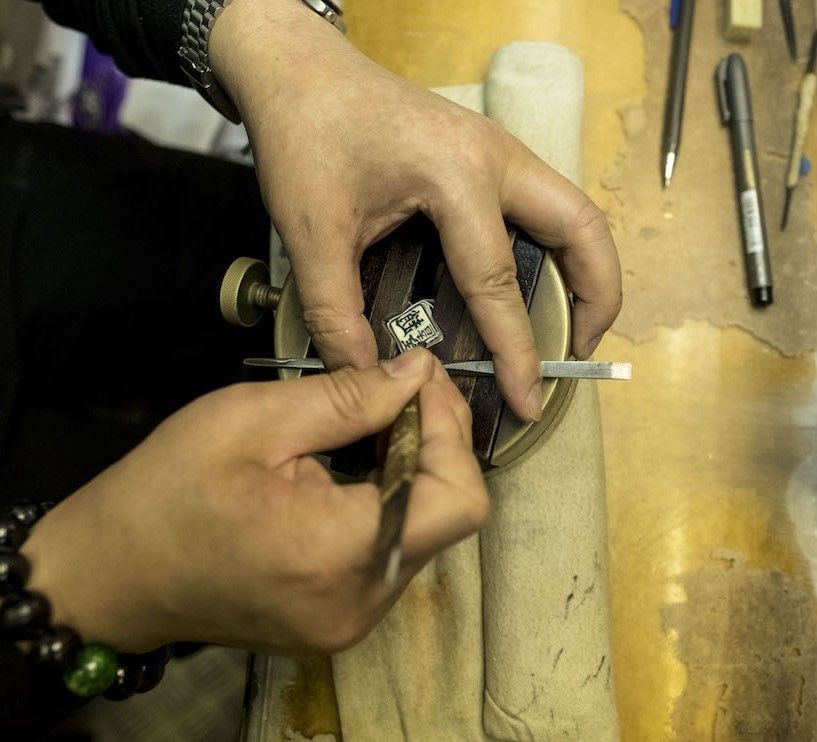
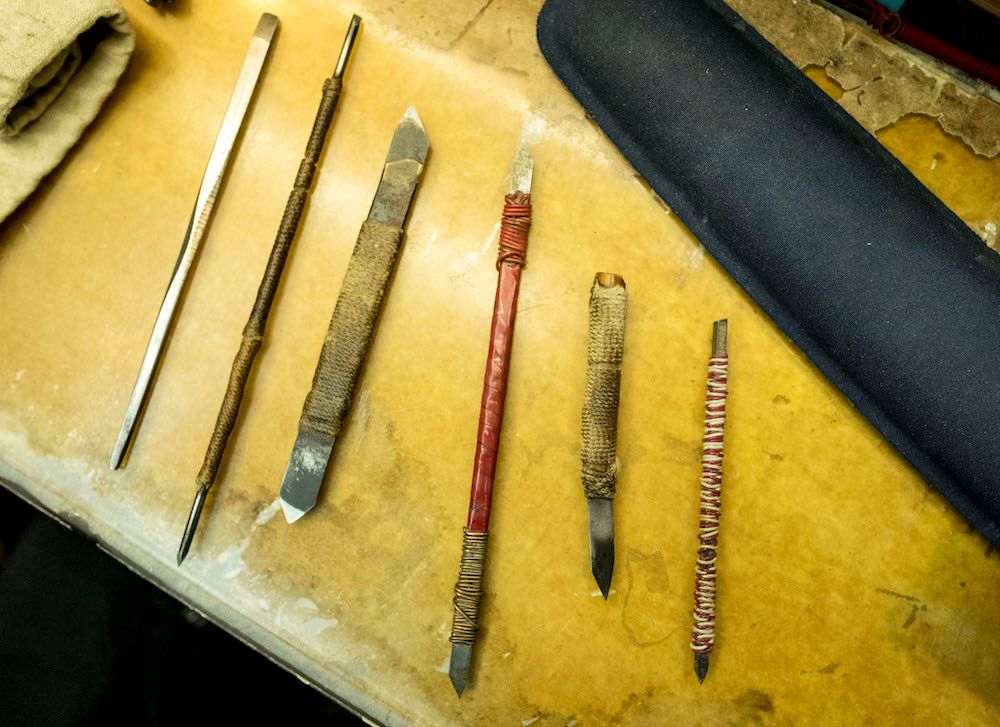
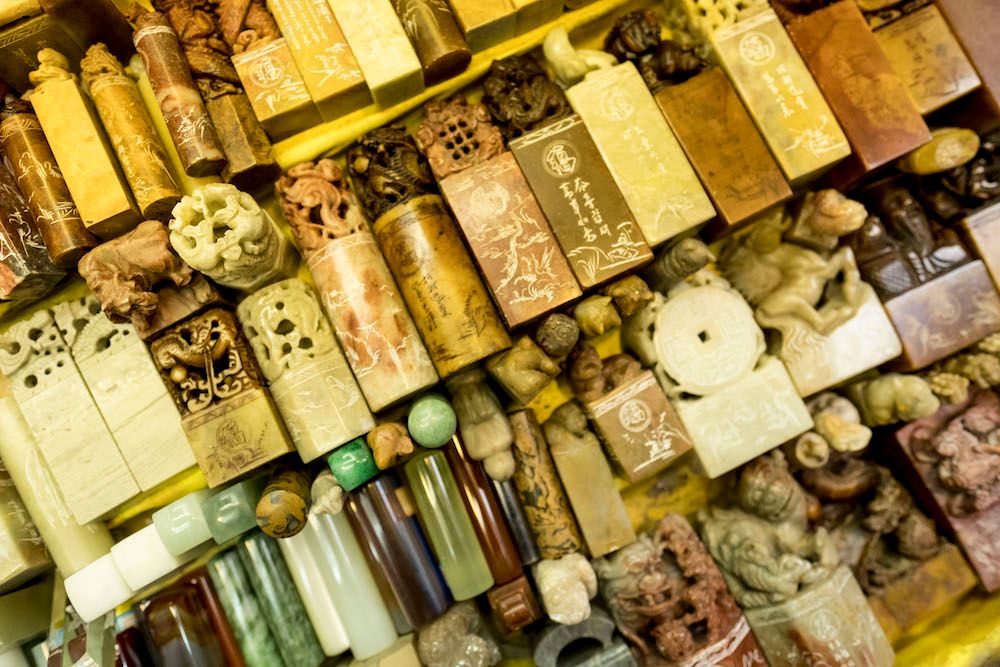
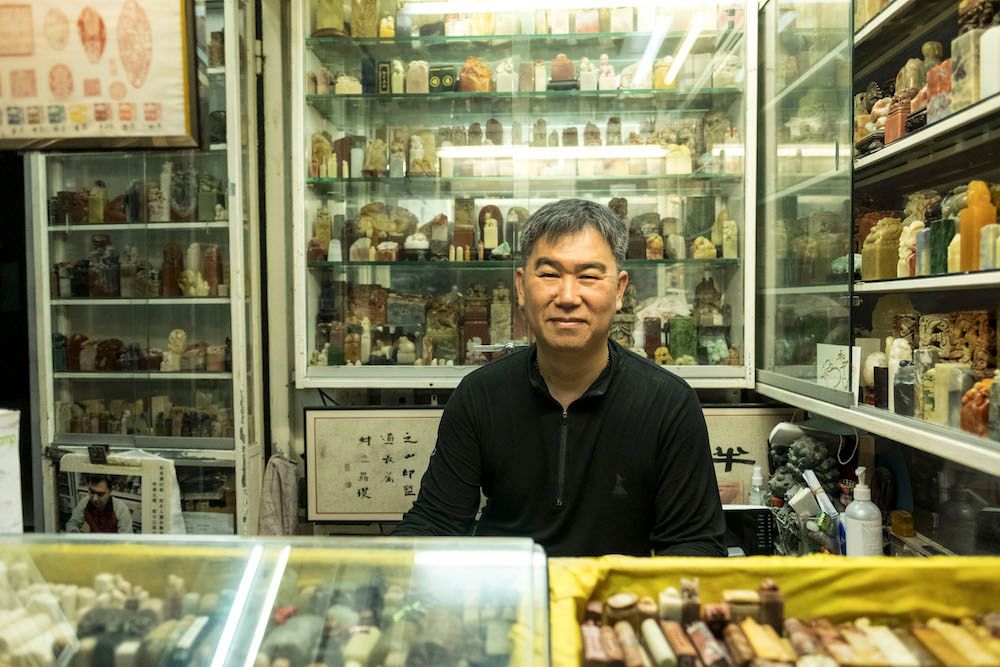
What to buy?
Have a stamp made. Choose from a variety of materials and suggest your own designs. Pick it up two days later.
Pun Han Sin Koon I Man Wa Lane I Central
10. Kan Kee . Noodles
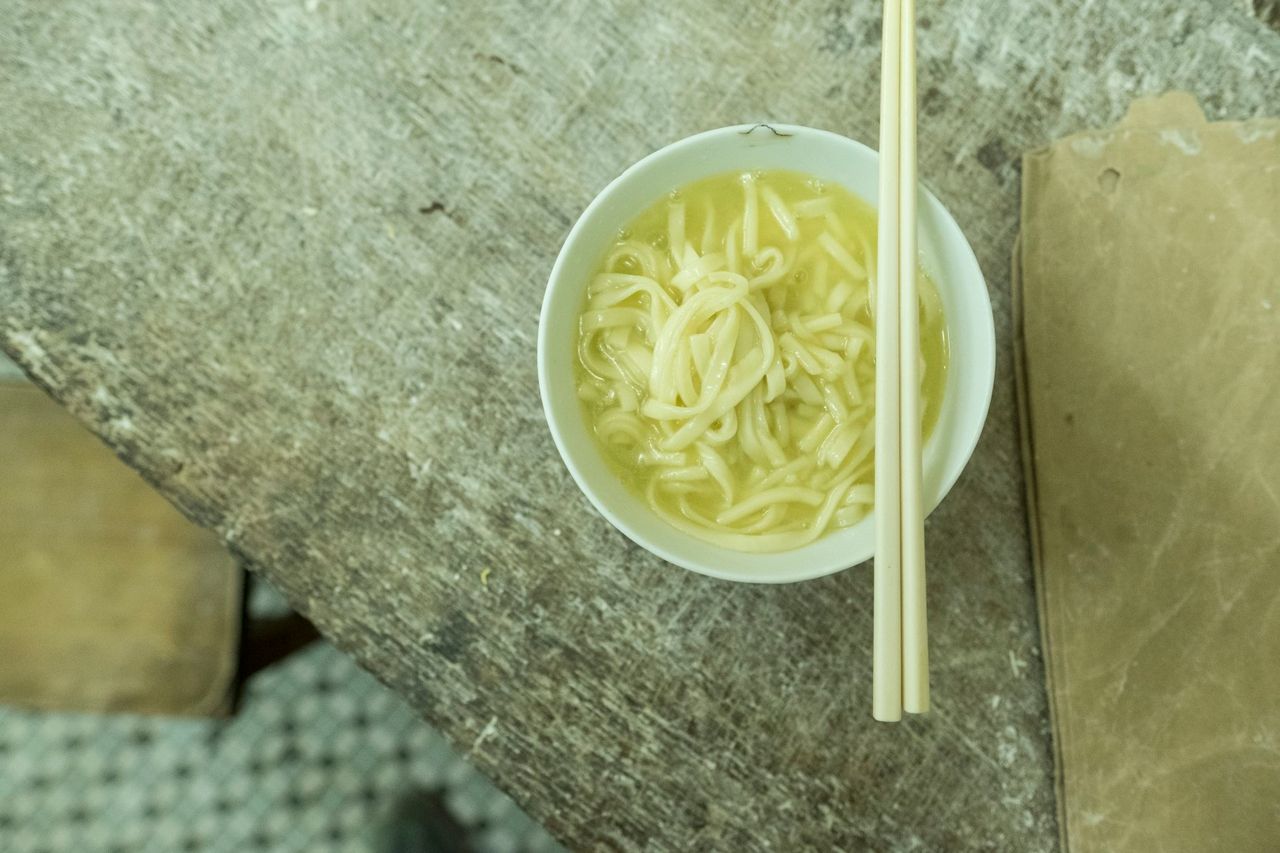
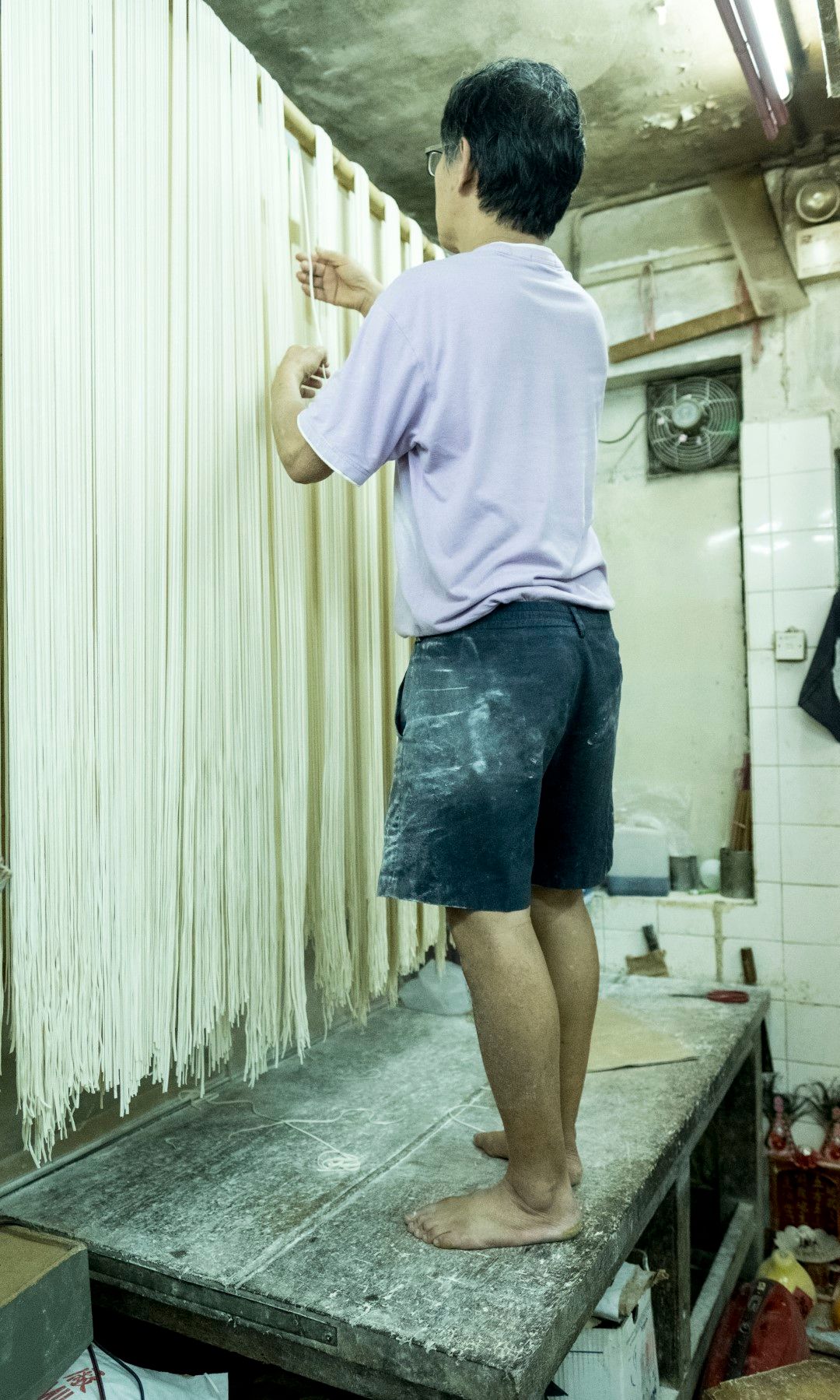
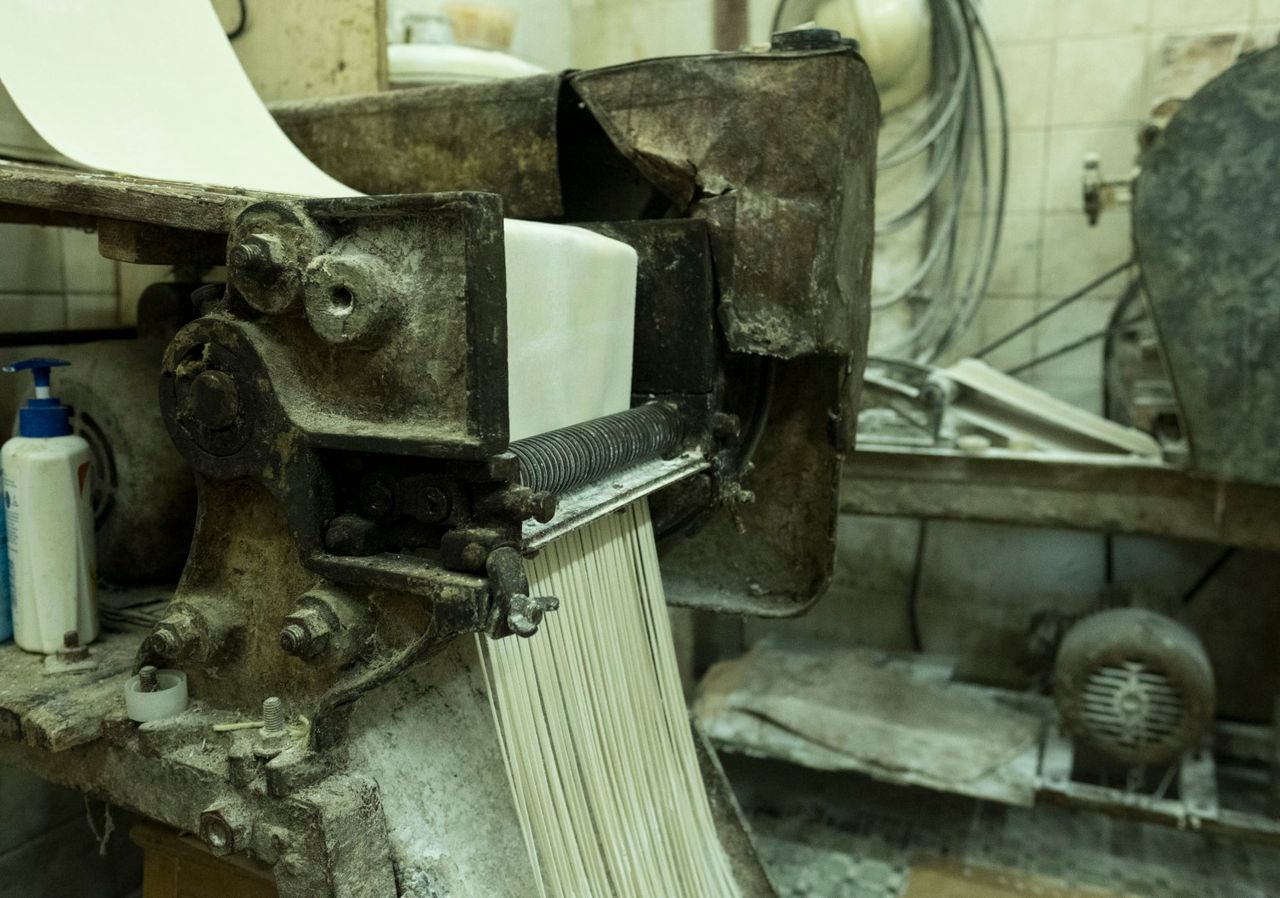
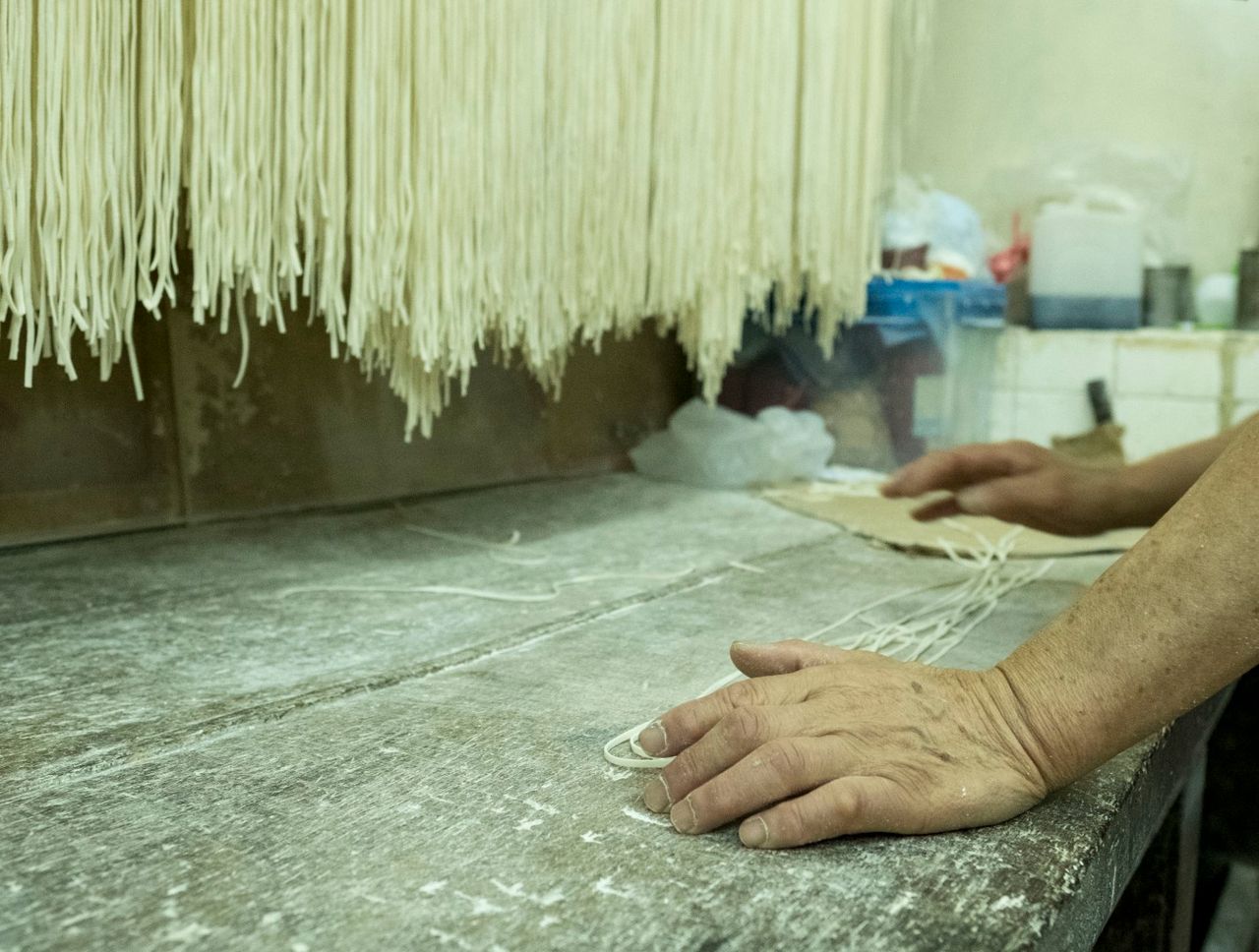
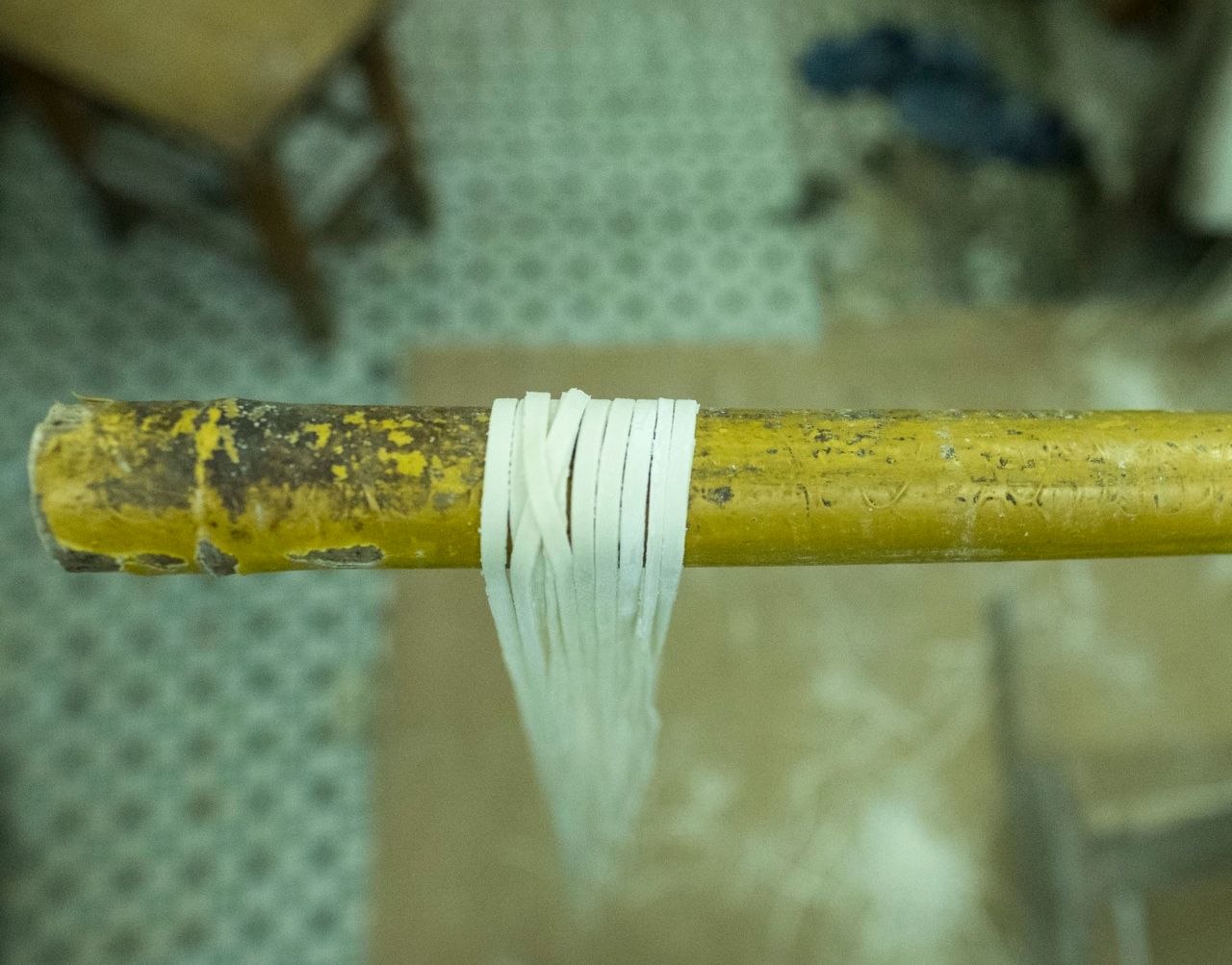
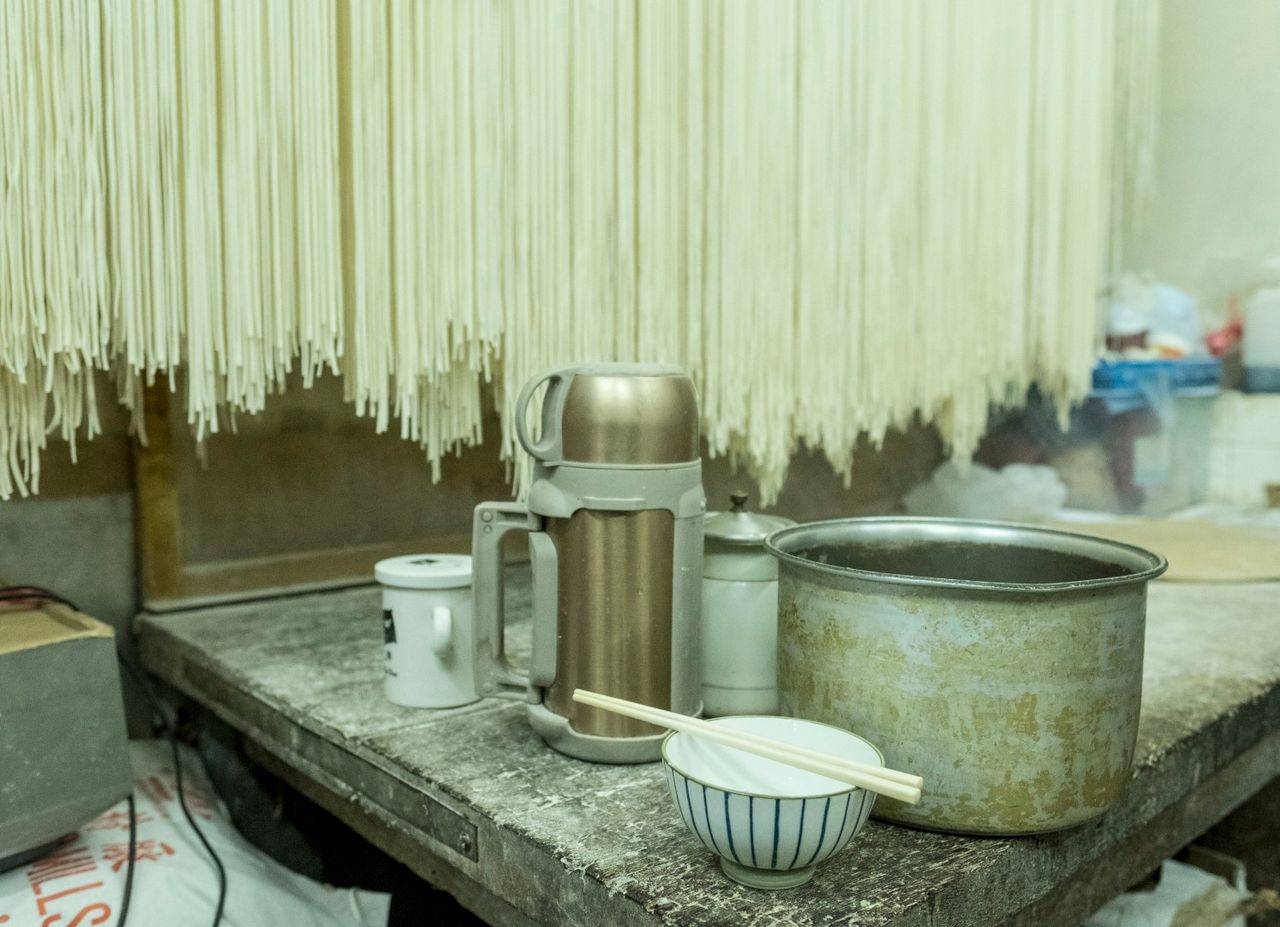
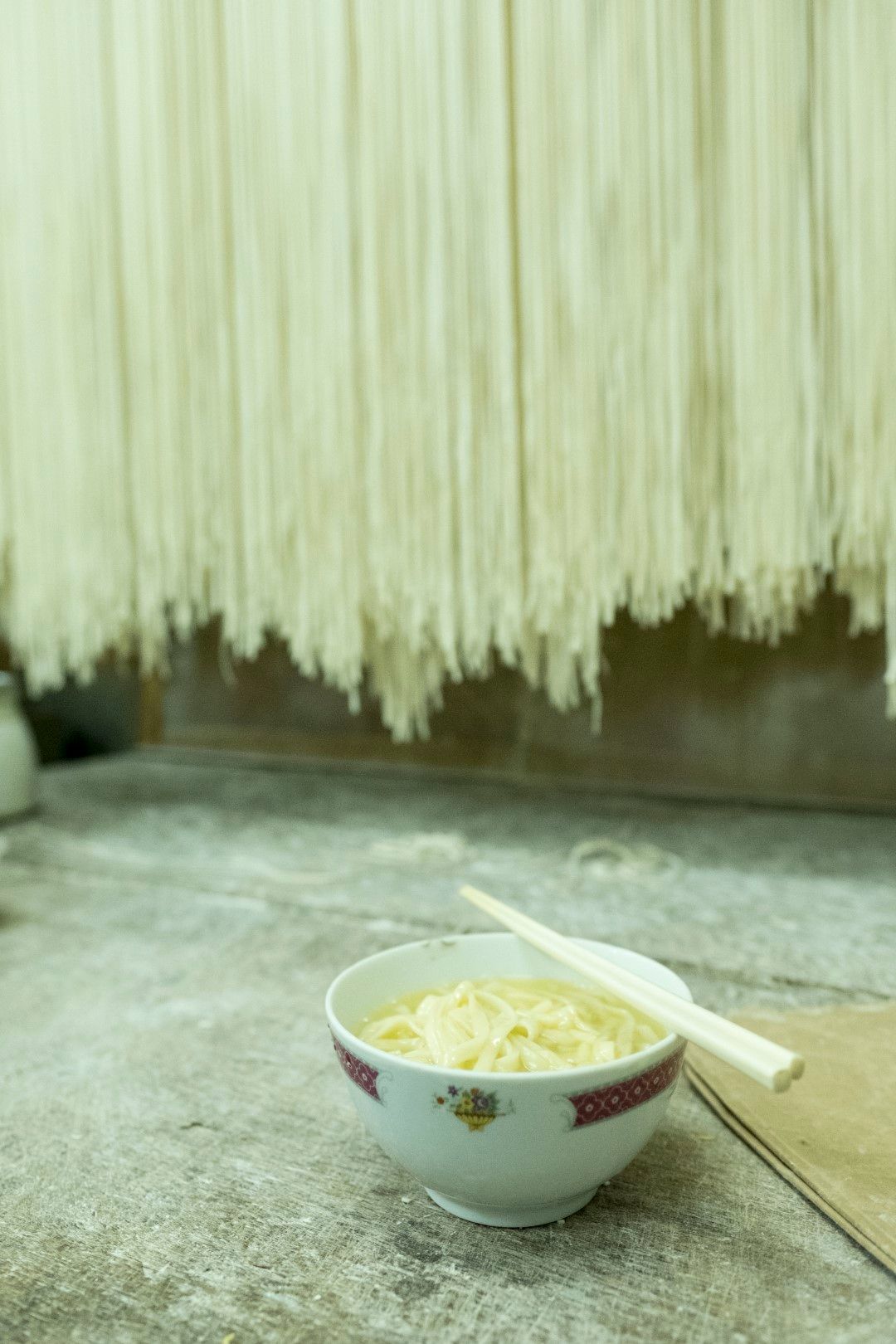
Oldest open-air market
The open-air market along Graham Street has been around for over 170 years. When Central Market closed in 2003 this was the only wet market left in Central to get groceries. A grassroots place, where residents come every day to sell, and buy fresh produce for a fair price. One of the street market’s gems is Kan Kee 勤記粉麵廠 at 15 Peel Street, a small workshop that makes fresh Chinese noodles. Manned by the gorgeous George who picked up the skills of noodle making 10 years ago, learning from the old masters and creating his signature style along the way.
What to buy?
Local keep coming back for the Shanghai noodles or wonton wraps, made fresh from scratch by George at the back of the shop.
Kan Kee I 15 Peel Street I Central
Explore Hong Kong's traditional shops
Hong Kong's older districts are home to many more one-of-a-kind family-run businesses. One of our favourite neighbourhoods is Sai Ying Pun, a district on the Western side of Hong Kong Island where local craftsmanship is still alive. As part of a neighbourhood placemaking project with Magic Lanes Studio and Caritas Community Centre, a group of local students roamed the streets to map locals' favourite shops and document the stories behind them. Hear their stories, share their passion and support their business, before it's too late.
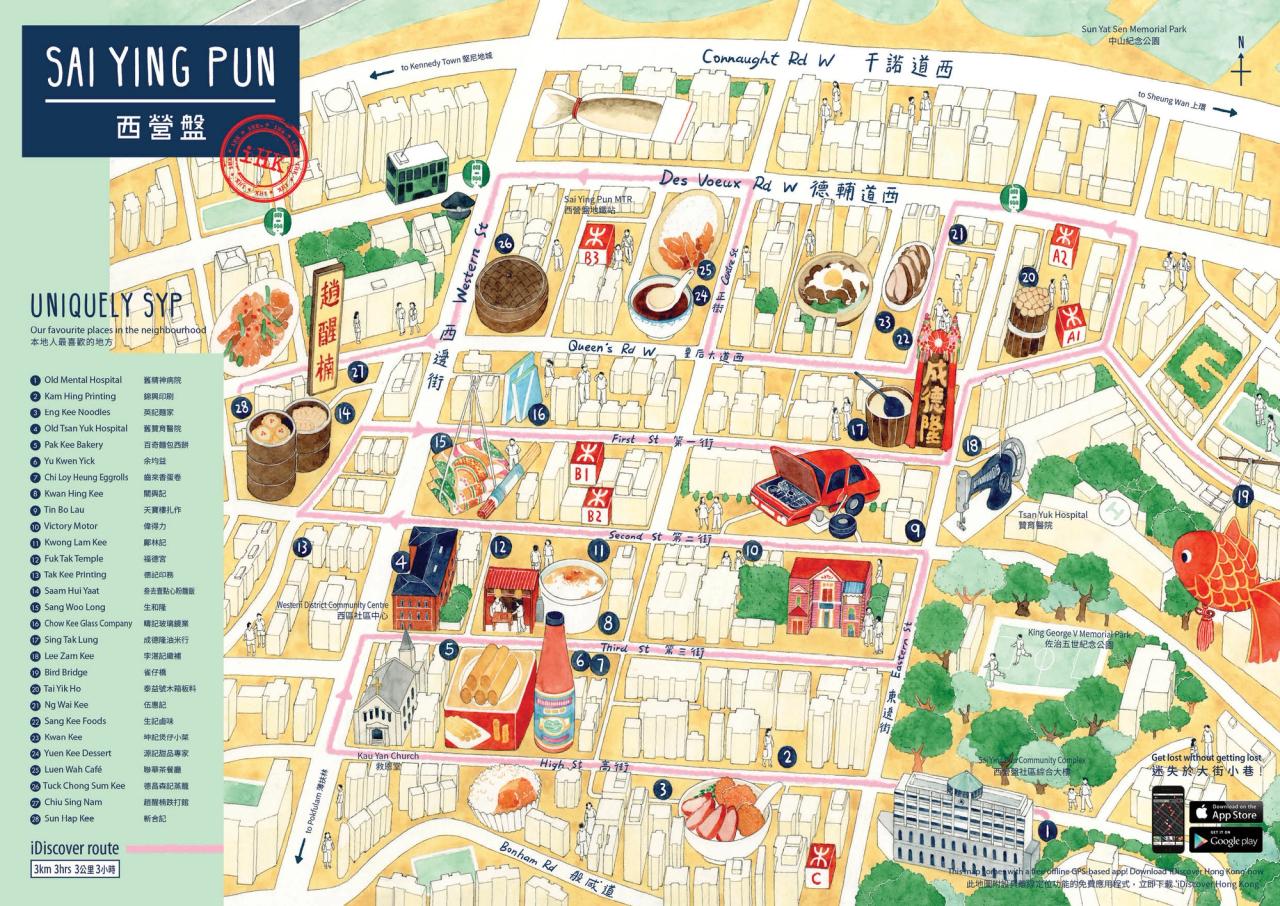
Credits
Magic Lanes

Powered by

Designed by

About
Magic Lanes
“Magic Lanes” is a community design studio in Sheung Fung Lane. Their mission is to reweave the social fabric and turn the small lane into a place for vibrant street life, an inspiring initiative from the joint Caritas and CACHe. “ 明愛與長春社聯手策劃「重塑西營盤―公共空間再生計劃」,在西營盤常豐里以一刻社區設計館為基礎,開展重塑社區空間的工作,促進居民參與,引發想像,凝聚共識,建設社區,再現街道生活,但求營造一個可以重覓人情的空間
www.facebook.com/magiclanesstudioUrban Renewal Fund Urban Renewal Fund
This project was part of an inclusive community placemaking initiative in Sai Ying pun by Caritas Community Centre supported by the Urban Renewal Fund.
www.sparkraise.comCarmen Ng
Hong Kong born painter and illustrator who loves paper, watercolour and ink. She has visualised the unique craft culture of SYP in her signature hand-drawn style. 香港出生的插畫家,以水彩和墨水作畫。 她以手繪風格展現了西營盤獨特的工藝文化。
www.carmen-ng.com